#it was written as the core of the show and it was so obvious during s1
Explore tagged Tumblr posts
Text
people claiming rina wasn't planned from the beginning and only happened because Olivia left would've not survived the 2000's teenshows ship wars
#ricky x gina#like honeys#you're clowining#hard#this was always going to happen#it was written as the core of the show and it was so obvious during s1#to the point were tim had several of his characters pointing it out in case the audience had any doubt#like#i feel for you#ive shipped the r/ni ship one too many times in teen shows and it sucks#but#stop being delulu 'k#hsmtmts#imma only this as ricky x gina cuz im respectful like that#rina
37 notes
·
View notes
Text
I'm still riding a high from Baxter Week last month so I just wanted to gush about how much I adore Baxter and his DLC! No specific rhyme or reason, but it is a nice break from my usual dives into the code!
Also, I won't be saying anything negative about Cove nor Derek; I don't need nor want to do that. I'll be comparing them to Baxter, but only for contrast/showing the skillfully written differences between them (example: Cove does [x] and Baxter does [y] to account for multiple player preferences).
(might go without saying, but there will be spoilers for basically his entire DLC)
The Background
I actually had no interest in Baxter when my MC first met him in the game. He was fine, I was neutral, but what it came down to was that I was one of Those People who just wanted time with Cove and excluded others (if it's not obvious, I always got a cold Cove unless I used the Cove Creator).
That all changed, funnily enough, during the Cove Wedding DLC. On a whim, I agreed to let Baxter give my MC dance lessons and prodded him on his disappearance after Step 3. Getting a hint of Baxter's underlying problems piqued my interest and I'd had the Baxter DLC downloaded before I even hit the reception!
After the Cove Wedding DLC was over, I rolled back to a save right before Soiree and got to romancing.
Zero regrets.
The Setup
As a character, Baxter is so beautifully designed as both a contrast to Cove and someone to fill out the gaps that Cove and Derek leave. He also completes the "comfort level" of love interests that I had in my head, where the MC can be whatever they want but each guy seems to have a particular comfort level themselves (Cove being Nervous, Derek being more Relaxed, and Baxter being Direct).
When if comes to their actual engagement through the family, Baxter has only brief mentions of his parents, Cove's story is partly connected to his parents whilst still giving focus to one-on-one time, and Derek's family is front-and-center to his conflict. It's all about how much time a player wants to invest in the character versus the time they want to spend with others.
Likewise, Baxter's route features a relationship that ends and gets back together again, Cove's route is a relationship where he and the MC always live close to each other, and Derek's route is a long-distance relationship past Step 2 and before Step 4.
Baxter's undeniably a controversial character, I imagine due to possibly being based on the "playboy" type, which tends to be someone who flirts with anyone they find attractive whether the recipient likes it or not, won't take "no" for an answer, and lies to their dates that they're serious about them when they actually don't care for them at all.
The game cleverly subverts this right out of the gate when Baxter first meets Cove and the MC. Baxter does find the two attractive and initially flirts with the both of them (a great start to confirming that he's pan), but backs off and apologizes the moment he notices that Cove is uncomfortable. He adds as well that he wouldn't mind having a summer fling, but that it's not his core reason for wanting to get to know and spend time with them.
So already, the player is made aware that he's forward but considerate, takes Cove's discomfort more seriously than even the usual residents of Sunset Bird (who enjoy teasing him into embarrassment), and has non-serious flings with a priority on simply having fun connections over the course of his time with them.
He, like Cove, will only propose a relationship with the MC in Step 3 if the MC expresses interest first (the only difference being that the MC expresses the interest in Cove to "the game" while talking to Lee, whereas the MC expresses interest in Baxter by talking to Baxter directly).
This gives the MC a powerful opportunity, as Baxter is a character that the player has the most options in interacting with. He begins as a total stranger, similar to Cove, and the player can decide whether he stays that way or becomes more than that. Even down to the optional moments he appears in, the MC only has to interact with him in Hang and Late Shift, both of which lets them avoid further interaction by going home early and rejecting his invitation to his house/telling him not to come to their workplace respectively. The only mandatory instances of seeing him are the Step 3 intro, a brief goodbye in the ending, Hang, and the very beginning of Late Shift.
Whether it be strangers, friends, friends that fell in love after they met again, a friendship or fling that started well and ended horribly, a fling that turned into genuine feelings in the end, or two people that love each other all the way through, Baxter's route can do it all. In Step 4 as well, the MC can choose to be calm, professional, upset, or angry about seeing Baxter again, which all lead to different conversations/narration with him, and the end of Step 3 makes him the only love interest where there can be a technical "break up."
This is also a rare occasion where the MC, due to Cove not being a fan of Baxter, can form a relationship outside of their normal range. Baxter doesn't live in Sunset Bird and isn't connected to anyone the MC knows - neither Cove's nor the MC's friends and family - at the time of meeting him, fitting the narrative of the MC starting to look at things beyond their little neighborhood and even the people they're close with. It can be further emphasized in Soiree where the MC starts to gain a bit of independence and can end up dancing with a younger Baxter, foreshadowing that little peek into the wider world from a mysterious stranger who's there and then gone.
Something else that's fascinating is that Baxter, due to him leaving at the end of Step 3 and meeting the MC again during Step 4, is the only love interest where players see virtually all of the MC's interactions with him. It does leave out the gaps that Cove and Derek have that can be neatly filled with headcanons, but that ultimately depends on what the player prefers. Point being is that the MC's experiences are the player's experiences when it comes to Baxter: whatever time they spend with him, the player also spends with him.
So already, the setup for Baxter and his route are really strong for me, but the content of his DLC isn't limited to just him.
The Content
Baxter's DLC introduces a total of two new characters and extra content for Terry and Miranda, both of which were absolutely welcomed by me. I was hyper-focused on Cove in the base game, but the Baxter DLC made me appreciate the other characters more.
Even the moms, who already got plenty of screen time, are shown to be rather nosy and gossip-y in Sightseeing (something not showcased overly until then), which ends up being the perfect encouragement towards the MC learning more about Baxter. Then, if the MC meets the requirements and agrees to Baxter's fling, Noelani in particular is stunned into silence. If the MC was upset with Baxter over what happened, then both moms will show a rare coldness to him as well.
These are all things one would miss out on with other interests, due to how the whirlwind relationship and drama in Baxter's route are designed.
Then there's Terry, who becomes Baxter's friend more directly in the DLC whether Baxter is convinced of that or not, and is given more to do in every best way. Baxter's version of Hang allows for more focus on Terry's relationship with Miranda, partly with more hints towards his crush on her but also seeing Terry interact with someone who's "like him." Cove and Miranda are described as "shy" and the MC can be equally as much, allowing for new facets of Terry's character to come through by Baxter's being there.
Even after Baxter goes no contact and Step 4 makes the shift to focus on his relationship with the MC, Terry's friendship with him isn't forgotten: Baxter laments that Terry isn't calling him by his affectionate nickname for him anymore.
Terry getting attention from being Baxter's friend doesn't exclude Miranda from getting any either; far from it. If anything, she gets more than Terry, both with an expansion on her family in the form of her brother (and eventual brother-in-law) plus a moment dedicated to giving her a birthday party. As if that weren't enough, she gets a mini-plot in Step 4 concerning her relationship with Terry and her role in his life.
Seeing more of Terry and Miranda was in every way a case of "thing I didn't know I needed until I had it." Maybe it was the Cove tunnel vision that persisted for so long, but when I first got to re-experience Terry and Miranda in Baxter's version of Hang, it was great and I was so happy any time they were on-screen.
They aren't given extra time just for the sake of it either; they're expertly woven into the overarching story of Step 3 and the themes of Step 4.
Step 3 centers on adulthood with the MC and their friends growing up and having to face the fear of growing apart. The step already does a good job at keeping that a focus, but Planning expands on it in a way that feels almost criminal not to have in the base game. The already high stakes feel even higher when put up against the last birthday party they'll be able to plan before everyone goes off on their own.
Then, Step 4 balances Terry putting forth so much effort for Miranda with her worrying that she's not doing enough for him. She doesn't need to worry, obviously (Terry loves her for every reason), but with Step 4 focusing so much on relationships, self-reflection, and trying to make up for past mistakes (both real and perceived), it's just a cherry on top of an already fantastic story.
Meanwhile, Jude and Scott, despite only appearing for Step 4, are easily some of my favorite characters in the game. They're adorable, they can be sweet with not just Miranda but the MC too (the player has the option for the MC to see them like honorary family/big brothers), and the way the groom's cake ultimately ties into helping bring Baxter and the MC closer again while serving as a callback to Planning is perfection. One may think little of Miranda's initial mention of them (probably assuming that it's just a little bit of character introduction to show that she has family who has things going on), but it all comes together in the end.
The DLC additionally has a potential bonus (depending on player preference) in that it is benefited by most other DLCs. The other DLCs are not required to enjoy it, but they add that little bit of extra flavor.
The Step 2 DLC adds Birthday and Soiree. Birthday is Miranda's birthday party when she's fourteen and before she officially becomes the MC's friend, meaning you get the development of seeing the difference in the MC's and Cove's investment in her party then versus now, as well as how her taste in parties has grown. Soiree allows the MC to possibly meet Baxter earlier than Step 3 and add to the "fate"/"destiny" angle if the player so desires.
The Step 3 DLC obviously allows for more Baxter in general with Boating and Late Shift, the former showing a much needed reaction from Lee if the MC is dating him at the time. It's also a good "starter DLC" for people who aren't sure about Baxter, allowing them to choose to interact with him if they want to get to know him more (as I mentioned before).
Derek's DLC lets the player meet Baxter in a different way during Soiree, something that can be brought back up with Derek in Step 3 and then again in Step 4 (to which he'll joke about the MC's meetings with Baxter in five year increments).
Even Cove's Wedding DLC can have advantage, bringing a soft conclusion to Baxter's story for those who don't want to play Baxter's Step 4 but still care for him, and/or something more dramatic following how he ends off Step 3 with the MC.
So one doesn't just get Baxter content; there's quality content from others and it can be further added to with other DLCs.
Not that the Baxter content isn't worth it all by itself either because I adore this man.
The Man
I'm a simple woman. Give me an intelligent man with simultaneously zero braincells and I am in.
I don't even like "playboy" type characters normally, but Baxter is actually charming and tries to make things clear to the MC from the beginning. He falters during the Step 3 ending but not because he was trying to keep it a secret; he genuinely didn't expect the MC to try to press him and deemed himself unworthy of their company.
I'd seen more than enough of rich boy plots where the rich boy is a perfect do-no-wrong type and it's everyone else's problem that they don't like him. Baxter, however, is a flawed character who not everyone is going to like (which is absolutely 100% fine and valid) and him being rich is not just something that influenced his self-esteem but also what he ultimately gives up despite having relied on that financial safety net for his whole life, showing a deeper sense of awareness as he got older.
I don't normally like fate/destiny stories either, as they often feel as though they're taking agency from one or both characters involved (in terms of forcing them to love/be in a relationship with each other), but Baxter's route isn't like that. It's the player's choice to have that dance in Soiree (which they can just as easily turn down), their choice to form a closer relationship with Baxter outside of the disinterested Cove, and their choice to choose Baxter's Step 4 when they have already one guaranteed "safe" option in Cove's Step 4 and a potential other "safe" choice in Derek's Step 4 if they have Derek's DLC.
The player is the fate, which coincidentally went into my first playthrough, as my MC was initially designed for Cove yet ended up being perfect for Baxter.
Baxter is so absolutely delightful and absolutely stupid at the same time. From his openness to be questioned by the MC followed by this assumption that he's like a stranger to them (meanwhile the MC and Cove being best friends/crushes right out of the gate if the player so chooses), to him talking about the play he and the MC go to while not seeing the obvious parallel to his own issues, to openly admitting that he doesn't want to leave the MC while making the decision himself to go no contact.
He unconvincingly uses the cupcakes as an excuse to not get more intimate with MC, he wants so badly to spend time with the MC that he's willing to risk letting them see him in his useless morning state (and is surprised when it goes wrong, at least in his mind), and tries to convince himself to not stay attached to the MC during Step 4 despite being unable to help constantly reminiscing on their time together.
At his core, he's a funny, charismatic sweetheart who wants to be loved, to be touched, to have someone in his life (even just a friend) that he can make happy, but his upbringing and deep-seeded insecurities make him cynical to the idea of being in a genuine relationship with someone. This causes him to constantly sabotage himself before he can make any progress. It's why he can prefer flings: he can use his money to make a passionate, pleasant time with his temporary partner, but not so long that he feels they'll find something disappointing in him.
Low-risk, high-reward.
This, of course, ultimately backfires by the end of Step 3, and it's perfectly structured to set him up for Step 4. The brilliant foreshadowing of him being skilled with planning events in a pinch, to Jude and Scott's long-distance relationship and Baxter claiming that they won't stay together, to Baxter insisting that it's unlikely for he and the MC to meet again (made funnier if they'd already met again before, if the MC saw him in Soiree), then Step 4 hitting where he's not only a wedding planner planning Jude and Scott's wedding, but accidentally/unconsciously putting himself into situations where he's "stuck" with the MC.
That starting instant where Baxter reacts to the MC in the restaurant, initially shocked and then having to bring himself back into a professional persona, apologizing for his immature self but sticking to only focusing on the wedding?
Not just a wonderfully-written hint to the player as to what they're in for, but very much a "I'm not stuck in here with you, you're stuck in here with me," situation. It's all about making Baxter as uncomfortable as possible so he can reflect, flying in the face of his thought that he could control everything and project what he thought about himself onto others. He can give advice to other people, but refuses to give the same to himself because he held himself to an impossible standard.
Once he finally figures that out, he's feels extremely guilty and apologetic towards the MC and everyone else. Him unloading all of his emotional baggage and work to do better is so satisfying after seeing it affect him in key moments like Drinks, Planning, the Step 3 ending, and finally Step 4. Underneath the facade he (weakly) attempts to put up for himself is a teasing gentleman who hates mornings, wants to see everyone around him be happy, and feels blessed just to simply have a relationship with the MC (real or temporary).
This isn't even talking about Baxter's perspective from a meta standpoint, adding layers on top of what's already there in the canon and adding even further when considering Baxter's appearance in the sidequel Our Life: Now & Forever.
The MC can learn in Sightseeing that Baxter had a crush on a kid who was doing ballet lessons while he did ballroom. Those who know anything about Now & Forever know that this is kid is Qiu, who's one of the two potential love interests there. Naturally, Baxter wouldn't have had a chance with them, as the only person Qiu can possibly fall for is the Now & Forever MC.
Baxter confesses in Step 4 that he's naturally drawn to the people who are "wanted by everyone else," which translates to Qiu (who is widely popular during Now & Forever's Step 1) and the MC (who is liked by most characters in the game and automatically crushed on by at least Derek). In the Cove Wedding DLC specifically, he adds that he is simply someone whereas Cove is the one.
Because here's the thing: in the eyes of the base game, he's not wrong. Cove is the game's focus, taking an active role in every step and being the first that the MC meets out of the potential love interests. He's the only love interest in the base game and his Step 4 is not just free, but the default.
Meanwhile, Baxter is just someone. He's a person who shows up in Sunset Bird for a single step - only showing up thrice - and then is entirely gone without his own Step 4. His DLC costs more than any of Cove's Step DLCs and the player already knows Cove, already has spent two steps with him, thus has far less incentive to get Baxter's DLC over Cove's own Step DLCs.
Then, despite Baxter appearing once in Cove's Step 2 DLC and twice in Cove's Step 3 DLC, most players won't experience the former (either due to focusing on Cove or not wanting to dance) and Baxter can be largely excluded in the latter if he happened to leave a bad first impression on the player.
And let's take it a step further. While Derek, like Baxter, doesn't have a Wedding DLC like Cove does, Derek can get into a marriage pact with the MC as early as Step 2, he can be dating the MC throughout nearly all of his Step 4, and the MC can agree to them moving in together before the ending.
Baxter has none of that. His DLC's story is steeped in drama and the earliest the MC can properly get together with him is after the wedding. There's no chance at a proposal (such as what can happen with Cove's Step 4, where they MC can date and then propose within an equally short timespan), no opportunity to move in with him, nothing.
He takes time, work, and actual money to get into a relationship with, whether platonic or romantic. It's a level of investment that not everyone would be willing to put in for someone, especially when only one Step 4 can be chosen out of the whole bunch.
Baxter's insecurities come from a very real place. His parents treated him like a child, all while expecting him to behave like someone their age, and they deliberately picked a town for him to go to that was near the ocean he feared (where it was unlikely for there to be people his age around) to keep him in check. In his mind, he's "broken" and incapable of being with anyone long-term.
Furthering that, there's a joke he makes about "being too late" if the MC and Cove are in a relationship by the time he appears, back when he wouldn't have considered himself a worthy partner anyway (also a bit of out-of-universe humor over how the MC couldn't get together with him whether they wanted to or not, due to being unable to break up with Cove). Despite that, he's pleased as punch to see the MC dating/married to Cove and hopes the best for them regardless of his potential attraction.
Baxter puts forth so much effort to try and make the MC's last summer in Sunset Bird memorable with the thought that he won't be seeing them ever again. The potential relationship he can have with them is the most stable he's ever had and it scares him when they make him feel wanted and important. All the while, he's convinced that the MC's friends and family are "better" than him and he'll only bore the MC if he remains in contact with them.
With his DLC, the MC - the player - get to prove him wrong: an MC who is liked by everyone and loved by up to three different interests, but end up choosing him in the end. Cove and Derek are "easy" and the MC has undoubtedly spent more time with them in comparison to Baxter - who would feel that either guy could make the MC happier than he could - but they have the chance to show that he is the one that makes them happy.
Baxter is so absolutely amazed to be in a relationship with the MC that he willingly takes in all the shocked reactions and potential backlash from everyone else due to his five years of going no contact. He's regretful when he finds himself back in old habits and eager not just to message the MC multiple times per day after they return home, but also to take time off to go visit them after his Step 4 is over.
I think that makes for an incredibly special experience: to have someone who comes last out of the three possibilities, doubts his true potential, and eventually realizes how misguided he is. It's not about who got the most time with the MC, or who got "dibs" on meeting them first, or what can be accomplished the quickest in their time with them.
It's about the MC forming a bond with someone, picking him despite the difficulties/limitations because they love him that much, the work he's willing to put into it in return, and finally the happiness that comes out of it.
For those reasons and even more, the Baxter DLC is by far my favorite.
156 notes
·
View notes
Text
Some consolidated thoughts on the new Digimon announcement:
Since it's set to Brave Heart, which is originally 4:13 long, assuming that they add an intro scene and round it off to 5 mins, I think that it's best to not have high expectations of the amount of content they will cover.
Having every Digidestined (including 02 kids) get substantial screen time is the highest bar I will set. If this requirement is fulfilled I will personally consider the video a success.
I can't seem to land on one solid reason for why we are getting a PV instead of a third movie to truly tie off the series (giving space for the Reboot version to take off into their journey so we're all like 68 and still watching & arguing about Digimon lol). I've seen a few comments about 02TB not performing well enough to warrant a third part, which I don't feel is the case because that move was even released in India, a rare occurrence, so the global popularity was definitely felt considering Kizuna was hit by the pandemic in this department.
I'm leaning more towards creative differences, because Kakudo has made it quite obvious that his vision does not align fully with the narrative that Kizuna, then 02TB have built. It's entirely possible that Seki and Kakudo just couldn't sign off on the actual plot presented to make a third movie, and decided to do their own thing hence the shorter format.
One staff at NYCC was introduced as being responsible for heading the new Digimon team, which does give me the hope that another anime series (REBOOT SEASON 2!!!) is in the works and they were just waiting for the 25th Anniversary projects to tide over before announcing it.
Onto the actual content of the video, I think for the fans that enjoyed Kizuna, especially the open ending (I'm Fans) a half-assed explanation of how Taichi and Yamato get back together with Agumon and Gabumon will be disappointing. That said, I don't think we'll really get an explanation for it but I do think the video can start off with Taichi and Yamato reuniting with their partners.
However, the tone set by 02TB implies that these guys are also well settled in their lives even without their partner Digimon, so for them to rush back into battle something HUGE would need to disrupt that flow, but can they even explain & sustain a huge occurrence like that in 4-5 mins? I don't want to answer this question lol.
Personally, I wouldn't mind a more laidback take, which leaves a lot of space for fans to interpret what happened, rather than just shoving sequence after sequence of important moments in high speed. Showing Taichi and Yamato and other older kids just going about their lives as adults and then there is that moment when they're hit by a nostalgic memory of their partners which starts off their path to reunion. I understand the need for having a villain for Taichi and Yamato to join forces and battle, but I'm totally okay with a more nuanced, slice-of-life version which hits home for all older Digimon fans currently struggling with adulting.
And finally, the controversial (still traumatized by it) Epilogue. I would prefer it if the point of this video is to show the reunion of the Digidestined and their partners, with the implication that this will lead to the epilogue shown in 02. But I also fear that in order to fit in the societal standard of "adulting", and with Seki being a part of this team most likely, they'll definitely add the married couples with kids tropes.
Keeping shipping aside, I think that showing Sora, Mimi, Miyako and Hikari in their exploration phase during Kizuna/02TB did wonders for their characterisations. Rather than shoehorning all of them into wives/mothers/tradfem roles, we actually got a glimpse of how they will always continue to break barriers and moulds, which is at the core of how every Digigirl was written originally. Still, as life goes on people do change so even if we see Mimi with a typical cooking show or Miyako the Mom, I wouldn't be as upset because Kizuna/02TB already gave us a good glimpse of how the girls are capable of forging their own paths, regardless of any male presence in their lives.
But jk we all know this is going to be a TaiYama fest so Idk why I'm even worrying over my girls, I will be grateful if we get Mimi on screen for more than 10 seconds 😂
So that's my thoughts, open for discussion, not condescending arguments 🫶🏻
#digimon#digimon adventure#digimon adventure beyond#taichi yagami#yamato ishida#sora takenouchi#koushiro izumi#mimi tachikawa#jou kido#takeru takaishi#hikari yagami#ayushitposting
41 notes
·
View notes
Text
So I decided to start posting my social media AU here, in parts, and without the few bits that happen off social media that will be on the ao3 version <3
As an introduction, here’s a little bit of context:
Baz is an world-famous singer. At the beginning of the story, he’s about to go on tour for his 5th album
He and Simon are in a relationship but it’s not public. Simon asks Baz if he can make a twitter account where he claims to be Baz’s boyfriend because he thinks it’d be fun to see how people react
Baz’s albums, because I’ve thought about them a lot —except for the first one— lol:
Ergo, - 2019
→ he just wanted to be pretentious with a latin word honestly + the word “ergo” has this intrinsic meaning of consequence. for something to have a consequence, there *has* to be a something, but there’s nothing that comes before the album. it’s his first. it’s a sort of oxymoron with just one word, something contradictory at its core, Baz likes that
I don’t really know what Baz’s first album is like. the themes would probably be rather dark, but I don’t have a clear idea of what the album would represent like i do for the others. and yet i know there’s an album before those others. something that started it all
Flowers in the Water - 2020
→ a reference to Ophelia from Hamlet, who drowned surrounded by flowers. in this album baz explores his feelings after his break up. he was the one to leave his boyfriend who he was in a pretty toxic relationship with though he still had love for him. so he never had much agency during the relationship (as Ophelia doesn’t have agency during most of the play and her life) and the one time he acted on his own, he ‘ruined his life’ -the feeling of despair after a break up, when you think you’ll never find love like that again, even if it was bad (as Ophelia did when she killed herself). Cliché image of the break up as a sort of death, but you can be cliché when you’re heartbroken
baz’s ex used to buy him flowers, so there was this vase in their flat that for a long time always had flowers in it. after a while, towards the end of the relationship, baz noticed that it had been a moment since there had been flowers in the vase, and that was one of the things that made it hit that his bf didn’t care about him anymore
BUT the ‘vase’ is replaced by ‘water’ in the title of the album – a nice metonymy – to better fit the Ophelia reference.
Portrait of the Artist as a Madman - Feb. 2021
obvious reference to james joyce’s Portrait of the Artist as a Young Man. Baz reread the book during lockdown so he had that title in mind. he used Madman instead of Young Man because we all went a little crazy during lockdown so that was his state of mind when he wrote the album
his most reflexive album, in which he writes very personal things about who he was and is, but also his persona as a singer and the way the music industry impacts him and his life
The Prophecy - Sept. 2021
baz really wanted to use the word prophecy in a title. it’s his favourite word in the english language. it’s a very meaningful word, prophecies were a huge deal for ancient civilisations, prophets are important figures in the abrahamic religions + he likes the idea of a prophecy, something being foretold, an inevitable end, no matter what one does. it’s very tragic, he likes that
this album is about his new relationship with simon, a romantic piece about how when they met, he felt like their story had already been written and all they had to do was play it out, he felt this inevitability that he associates with prophecies. simon is the love that was foretold for him
Metamorphoses - 2022
in reference to Ovid’s metamorphoses. Baz reuses some of the stories in the Metamorphoses while also applying them to his life, creating songs that are a blend of mythology and personal. (his fans love trying to guess what is merely his interpretation of Ovid’s stories and what is personal elements he added to the songs). the songs are ordered in a way that shows how baz was transformed throughout his life to become the version of himself he is at the time of writing the album. a sort of memoir told through a dozen songs
Paroxysm - 2023
paroxysm: a sudden sharp attack (of pain, rage, laughter, etc)
the meaning of the word is why baz chose it as a title. he thought it fit the album, which he wrote very differently from his previous ones –in bursts. his creativity was renewed after Metamorphoses, which was a project that felt to him more like writing a book than songs, and it expressed itself differently. in this album, the topics he writes about are all different, with nothing to give a coherent theme to the album… which is the theme in itself. all the songs are little paroxysms
38 notes
·
View notes
Note
hiya zen ! i'm sorry if this has been asked before but it just seemed like such a fun concept to explore.
on to the question, which of the seven deadly sins do you think fits nagito best ? honestly, he's so complex and putting him into a small box is already difficult enough as it is, but combined with the fact that... pretty much none of them are accurate to his character, it's pretty difficult to tell.
i've seen people (on r/danganronpa, so not too surprising) say he's wrath, which feels ,,, iffy to me. that doesn't feel like it fits him at all. his desire of wanting the very best for others seems to contrast with wrath. honestly, willing to bet those people just went "oh evil person who does bad things bc it's fun ok must be wrath then".
one i have mixed feelings about is envy, which... fits hajime better than nagito imo. sure, his entire worldview is kind of based around talent, but it doesn't feel like jealousy to me. the core of his character is that: due to trauma and the talent-obsessed society around him, he starts to hate himself... and instead of trying to desperately give everything away to change that like hajime , he just... accepts it. he accepts it as a part of himself, or hell, as the entirety of himself, as if that was all there was to him. hell, he even states *twice* that he doesn't envy the ultimates. once in the beginning of chapter 2 during his monologue, where he states that:
"Ah, just so you know, what I feel is different from admiration."
"Admiration is... wishing you could be like the object of your admiration."
"But, what I feel is more... pure. More like a selfless love that wants nothing in return."
And, once at... the beginning of the OVA i think ??? it's been a long time since i rewatched it so I don't really remember but he says something about how... the star of the show is such a demanding role, and how he'd rather remain as he is or something ???
pride is crossed off for obvious reasons LMFAO.
greed isn't accurate to him either. his only motivations are for others, not for himself. and even then, he wishes for an " absolute hope that can overcome any despair " . he doesn't even wish for an material possessions, if that makes sense. can hope be found through those material possessions ? i mean , probably. but like... what he wishes for is.. not only selfless , but also... so abstract ? i don't think he'd be a big fan of the idea that you could achieve pure hope through something material. he views it as absolute good, an absolute good like that would usually be found in other things than just something so limiting as material possessions. I'm pretty unsure about this part though.
lust is... eh. lust is almost always interpreted in a sexual sense, but it can also work in other contexts, though i'm not sure what definition would be in that case. i guess he's lustful for wanting the best for people LOL ??? that sounds so weird.
the people who say nagito is horny all the time would argue nagito is lustful in the sexual sense, and i mean , maybe but not really ? we know he compares hope to sex in one of the songs written by megumi ogata (which i'll consider canon), but he we also know that he absolutely isn't a sex freak by any means and in the games and anime, is actually pretty chaste. he also views sex as something intimate to share with a person he loves. something to share with a person who loves him enough to be intimate with him as well, and pretty much just... mutual expression of trust and intimacy ? i'd interpret lust to be like.. sex obsessed, pretty much. which, of course, kind of contradicts nagito.
anyway, i briefly considered sloth for him, in the sense that he doesn't want to put in effort to achieve something great for himself. it's all for others. he's never going to put in effort for something if it is self-serving, and... even though he ends up significantly influencing other people's lives, he plays a much more passive role in his own life if that makes any sense ????? oh, and it could also be telling of his luck in a way, in the sense that he's kind of... bound to it and can't escape it ? i have no idea 😭 to be honest, this one is atleast slightly understandable, unlike all the others which are just blatantly inaccurate to his character LMFAO.
i don't know, those are just my thoughts. what do you think ?
I just need you to know what I was giggling and kicking my feet over how much of a Nagito understander you are,,, this is such an interesting question it absolutely has not been asked before!!!
That being said, I’m honestly on the same page as you are. I’m a little stumped since none of them really describe Nagito properly? Sloth is the closest one that you could twist into a way of it fitting him, but otherwise most of the others are blatantly inaccurate to important aspects of his character??? I know that isn’t really helpful, but man is it hard to assign him one when he’s so unique. Nagito and Hajime are different sides of the same coin, and I don’t think Nagito’s selfless love, “envy,” or “admiration,” fits into any of the boxes that are provided. The end result feels like he doesn’t fit any of them, but the goal here is to assign him at least one of them right? So I guess Sloth in this situation is the best option, supposedly reflecting specific aspects of him and how he basically never does anything self serving. I mean, at the end of the day I’d like to have slightly understandable over blatant mischaracterization LMAO. So yeah, I think I would agree with Sloth over the others.
Thank you for your ask, this was so interesting to think about!! It made me so happy to read how thoroughly you thought about this, and how much you understand his character <3
#nagito komaeda#danganronpa#sdr2 nagito#danganronpa nagito#sdr2#danganronpa komaeda#sdr2 komaeda#komaeda nagito#danganronpa goodbye despair#nagito#komaeda#sdr2 nagito komaeda#nagito dr#nagito dr2#dr nagito
30 notes
·
View notes
Text
Restless Rewatch: The Untamed, Episode 38 part one
(Masterpost) (Pinboard) (whole thing on AO3)

Warning! Spoilers for All 50 Episodes!
OK But Why?
This tale-within-a-tale is excruciating, yeah? So let's start off by considering why it even exists. Yi City feels like, if not a fully separate story, a pretty complete arc that can play as its own little movie. And it's incredibly sad, in every direction. While it may have begun life, in its originally-written form, as a different story exploring some of the same themes, MXTX placed it in the novel deliberately, and the producers of CQL included it deliberately. Why? Other than the, you know, catharsis of a well-wrought tragedy?
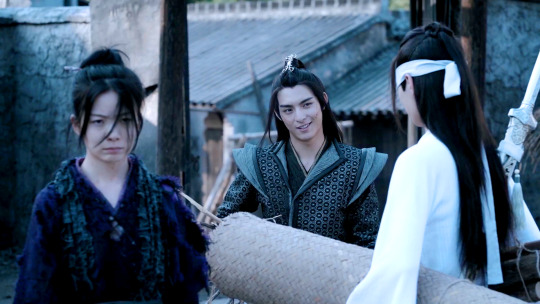
I think the answer is that it tells a set of parallel stories, alternate versions of the stories our main characters inhabit, with different outcomes driven by the character's choices. There's an obvious parallel between Lan Wangji's grief and Song Lan's, and another clear one between Wei Wuxian's core donation and Xiao Xingchen's eyeball donation.
And there's an important comparison to be made between Xue Yang and Wei Wuxian, two demonic cultivators. They share some formative experiences, but have followed radically different paths, shaped, at a key moment, by another person's choice.
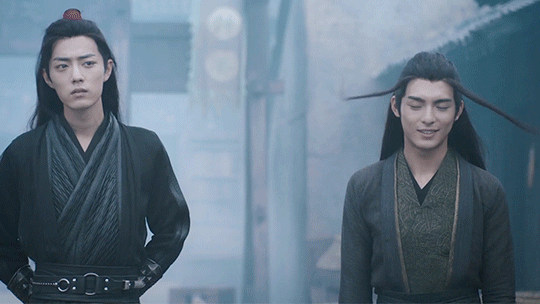
Overall, the Yi City story illustrates how choices made in a moment affect not just an individual life, but ripple outward into other lives. So be prepared for me to point out parallels even more than usual, as we go through these episodes.
Empathy
We start off learning about Empathy and how it’s sooper dangerous, which means of course Wei Wuxian is totally down for it and probably invented it. He gathers the kids around and assigns Jin Ling to be the person in charge of supervising and deciding when to pull him out of the matrix link.
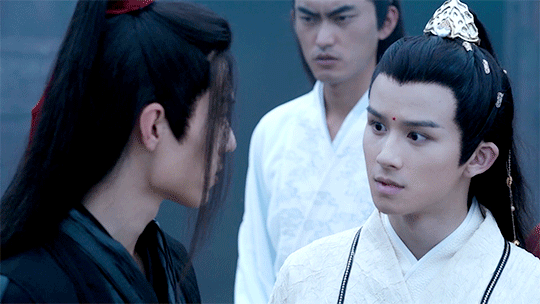
Jin Ling is surprised and reluctant so teacher’s pet Sizhui jumps forward and volunteers.
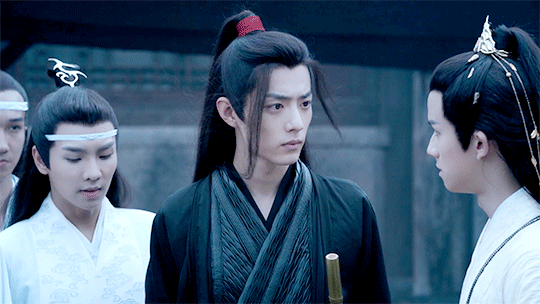
Wei Wuxian asks Jin Ling for his Jiang clarity bell, which is on a tassel that used to be Jiang Yanli’s.
(more behind the cut!)
Once the bell/tassel is out of Jin Ling’s hand, however, he changes his mind and snatches it, and the responsibility, back.

It seems like Sizhui might recognize this tassel?
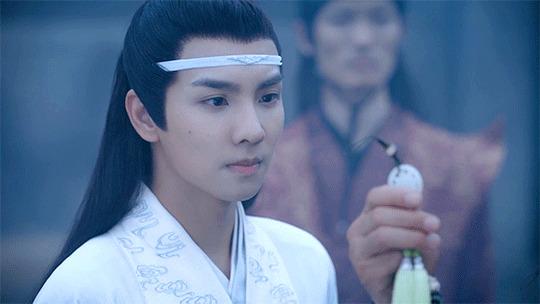
It’s like the one Jiang Yanli gave Wei Wuxian when they met up before her wedding, which means Wei Wuxian would have had it with him during their year in the burial mounds.
Jingyi disapproves of Jin Ling’s mind-changing, which is a little unfair since JL didn’t actually say “no” prior to Sizhui putting in his oar. (Sizhui is entirely loveable, but he is also a pushy brown-noser just like Lan Wangji was at his age. He just does it so sweetly that nobody minds.)
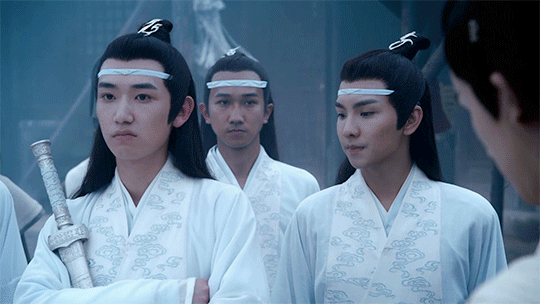
Sizhui, also like his Lan dad, has made it his life’s mission to manage a loudmouth hothead’s temper for him.
Heading into empathy with A-Qing, we get flashes of bits of the story that we're about to see in depth. Then we jump to "ten years ago" which, given the way this series does math, probably means seven years ago.
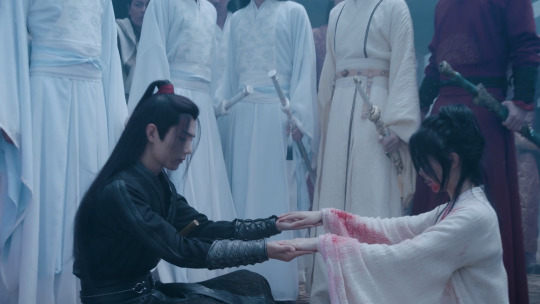
Side note: A-Qing has managed to keep her hair looking pretty cute despite being 90% dead.
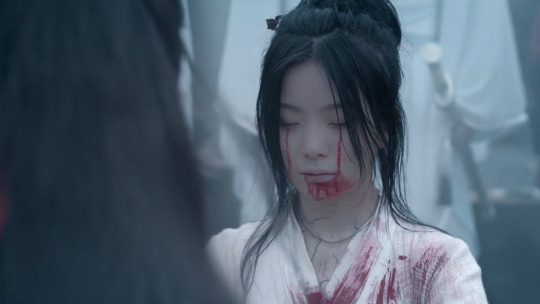
Splish Splash
This particular section of the Wuxia River of Sadness is reserved for people who are contemplating the total mess they have made of their lives (gifset here), but A-Qing didn't get that memo, so she's having a nice time splashing joyfully without a care in the world.
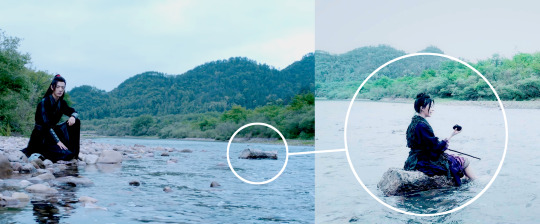
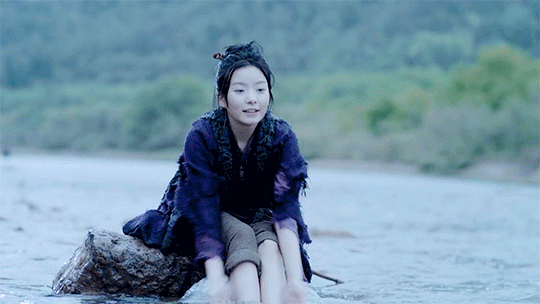
A-Qing isn't about drama or being depressed, even when things are pretty difficult. She has found a big rock to sit on and is having a nice day hanging out on it.
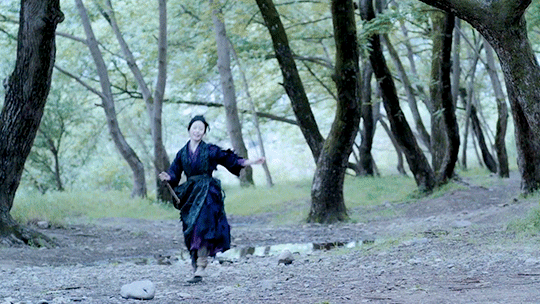
Then she goes skipping along singing "la la la la" (which is the same sound in Chinese as we make in English when we're singing and don't know the words, incidentally). Ok, show, we get it, she's happy and carefree. I sure hope she doesn't get involved in any weird relationships.
Grifting
She sees a couple of women walking on the path and she starts pretending to be blind. In the book, this pretense was facilitated by her having completely white eyes, but in the show she has normal brown eyes, until she actually is blinded by Xue Yang. So her entire pretense of being blind is to unfocus her eyes a bit and wave her hands around...

...with frequent intervals where she thinks no-one is watching her, and she acts 100% like she can see. Somehow she is almost never busted for this.
The ladies give her a steamed bun and whisper loudly to each other about how pitiful she is.
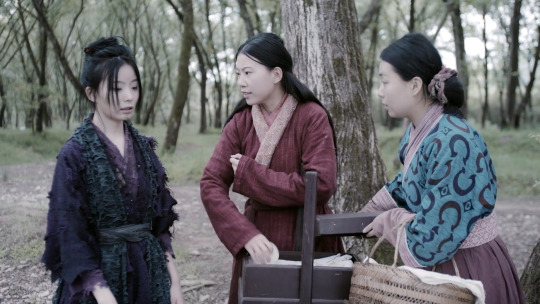
Then she heads into town for a little grifting, picking a wealthy douchebag as a mark. She bumps into him and steals his money bag, which he doesn't notice because he's too busy creeping on her.

She's annoyed and disappointed that he doesn't have a lot of money.
Hey Pretty, Don’t You Want To Take a Ride With Me
Next she bumps into (and robs) Xiao Xingchen, who is actually blind, so he doesn’t notice her noticing how extremely pretty he is.

He does notice that she has robbed him, however.
Did you know if you have your eyes removed or even just damaged so you can't see any more, your eye sockets and/or tear ducts will bleed pretty much forever? Yeah, me neither.

Xiao Xingchen immediately takes charge of A-Qing, telling her to walk more slowly and then telling her - kindly - to return his money purse. Before she can answer him, the rich douchebag comes back to yell at her and try to hit her. Xiao Xingchen stops him and smooths over the situation, and then lectures Ah Qing about stealing and how it's bad. But he tells her to keep his money, so - mixed messages, bro.
She calls him gege and says that since he's blind and she's blind, she's going to follow him forever. He’s like, okey dokey, and they walk off together. Is she really the first person (since Song Lan) who’s had this idea about him? He is *very* pretty, after all.
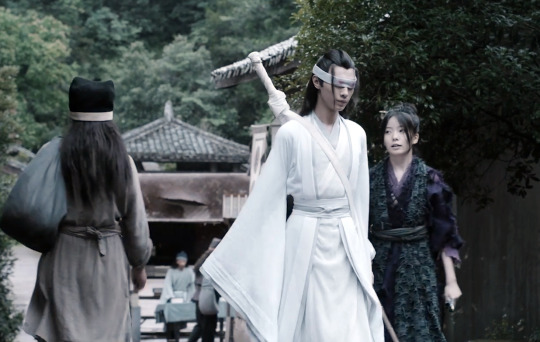
It's unclear to me if she's calling him gege in the sense of “orphan girl who wants a family,” or in the sense of “mostly-grown-up woman who would like to Hit That.” Xiao Xingchen appears to take it as the former; he is too gay virtuous for the other option.
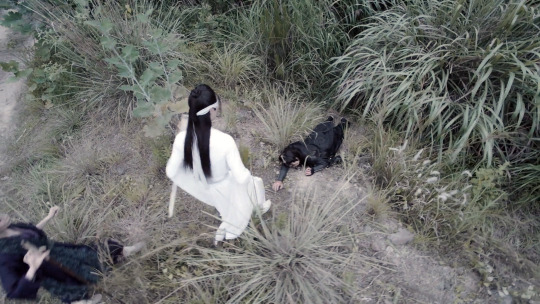
Two seconds after they decide to stay together, they encounter Xue Yang lying injured by the side of the road. A-Qing pretends she didn’t see him, and almost successfully wangles a piggyback ride out of Xiao Xingchen.
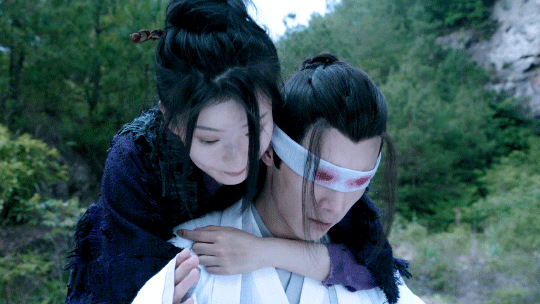
But then he hears Xue Yang and immediately decides to rescue him, like the do-gooder Xue Yang despises him for being.
Xue Yang gets the romance-tropey piggyback ride that A-Qing was hoping for. Girl, the time to stop trying to seduce your gay male friend is 5 minutes before you started, ok?

So...why was Xue Yang lying by the side of the road with a stab wound? Who gave it to him? If Jin Guangyao was sick of him, he would have stabbed him 100% fatally, and he wouldn't have let him hang on to Tiger Seal 2.0. And presumably Xue Yang wouldn’t think of him as a friend any more. It’s a mystery.
The new throuple decide to go to the creepiest abandoned walled city that has ever existed, and head past all the regular houses to set up camp in the morgue, for some reason. Not even inside one of the buildings; just out in the courtyard with a bunch of possibly-occupied coffins. Xiao Xingchen is so fucking weird.
Each Unhappy Family is Unhappy in its Own Way
Xiao Xingchen gets to work patching Xue Yang up, and Xue Yang wakes up and recognizes him. A-Qing explains that they are blind and tells him not to be rude about it.
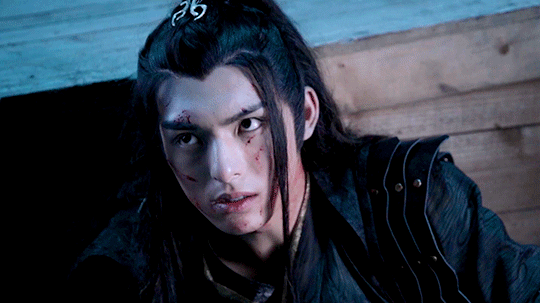
Xue Yang takes a second to process the situation, and then decided he’s going to hide his identity and make nice with Xiao Xingchen. Proving that found family can also have hideous toxic dynamics.
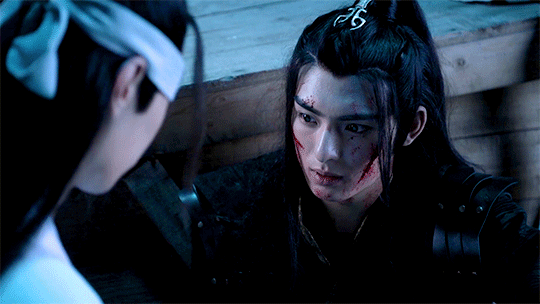
Xue Yang is very careful to keep XXC from touching his hand, since that would give away his identity. He has a...prosthetic finger? He wears a black glove and keeps his pinky finger straight so we know it's a replacement, or injured, or something.

I think this is a concession to Wang Haoxuan having ten functional fingers and the show having a limited CGI budget. In a real sword-based society, missing a finger is probably not particularly uncommon, and he would probably just rock the nine-fingered look without having a special glove.
At this point, the complex interactions of the trio get rolling. Xiao Xingchen is honestly kind, Xue Yang is fake-kind, A-Qing is fake-unaware with Xue Yang and is unable to make Xiao Xingchen understand the problem, and Xiao Xingchen is genuinely unaware of everything.
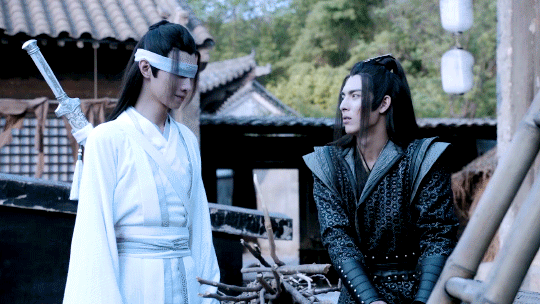
We spend a fairly large amount of time with Xue Yang and Xiao Xingchen playing happy families. As part of his false persona, Xue Yang adopts a coy and whiny tone when talking to his pet white-clad cultivator, remarkably like another demonic cultivator we know.
I’m pretty sure Wei Wuxian has never managed to cop a feel while his sweetie climbs up a ladder, however.
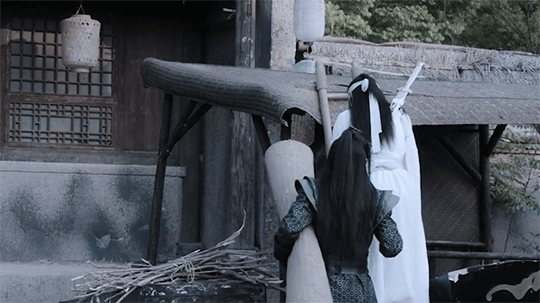
Then again, neither Lan Wangji nor Wei Wuxian has ever needed a ladder to get onto a roof, so maybe it’s just a lack of opportunity.

This relationship, on the surface, is cute and sweet, which just makes the reality of it more disturbing. It’s super uncomfortable to watch, but there’s more than manipulation happening in these interactions. As Xue Yang flits around doing domestic tasks like patching the roof of the crappy outdoor shelter that they absolutely do not need to be using, he tells Xiao Xingchen various true things about his early life, and we begin to see what shaped him.
Xue Yang (like OP) is obsessed with candy. In Xue Yang’s case, he was a hungry street kid who loved candy but couldn’t usually have it because of poverty. We learn that he has skills in patching up inadequate housing because he did it growing up.
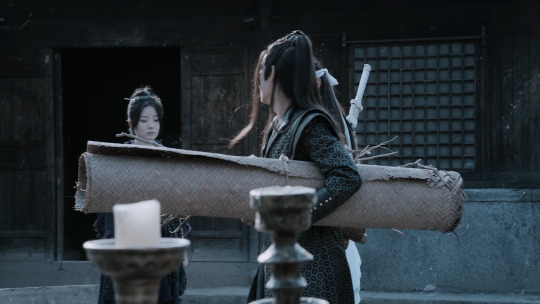
And we learn that he was beaten a lot.
So he and Wei Wuxian have these things in common - except now Wei Wuxian gets his sugar from alcohol, not from candy. And Wei Wuxian’s handyman skills are used to make a home for his former enemies in the burial grounds, while Xue Yang’s are used - also in a cemetery, of sorts - to manipulate and trap his enemy.
I Want Candy
In classic predator form, Xue Yang uses candy to lure A-Qing into coming within stabbing range, because he thinks she’s faking her blindness and wants to test her.
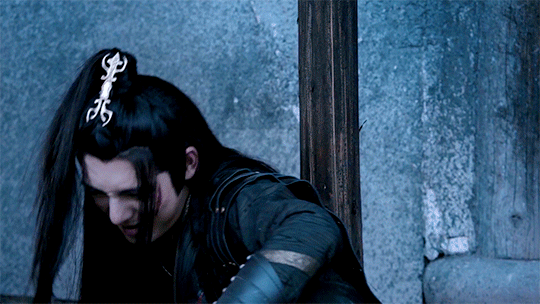
I find him super attractive right here in spite of his evilness. I’m pretty sure it’s because he’s offering candy. (OP goes and gets a jolly rancher out of her purse).

After calling her over, he draws his sword with a super-loud "sshshk" noise that she inexplicably doesn't notice, and she bravely walks up to, and nearly on to, the point of the sword.
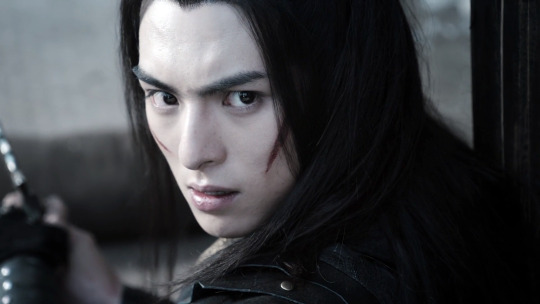
This shocks him and convinces him that she's really blind. He sits her down with apparently sincere gentleness, and gives her candy, while quizzing her about her hot gege.
A-Qing tries to warn Xiao Xingchen about Xue Yang being a bad guy, pointing out that he's a cultivator and won't tell them his name. (She can’t say “also he tried to stab me” because she’d have to come clean about being able to see.) Xiao Xingchen, because he is a condescending prick--albeit a very sweet one--pats her on the fucking head and laughs off her extremely useful warning.
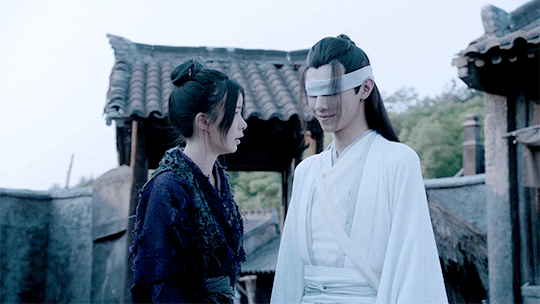
Xiao Xingchen came out into the wider world with a set of ideals that he lives by, apparently without examining them. He’s humble, kind, frugal, and wants to eradicate evil. He also believes that the majority of people are good like him, and that detecting evil is simple--as simple as following his sword toward it. He doesn’t allow A-Qing, who is experienced in the wider world, to teach him anything, preferring to keep his ideals untarnished.

Contrast this with Lan Wangji, who also starts his journey into the wider world with a set of ideals (codified as rules), but does not make the mistake of assuming that other people shares his beliefs. Once he’s away from the Cloud Recesses, he follows Wei Wuxian’s lead when dealing with new people, rather than insisting on doing things the way he did back home. In general, he is open to having his beliefs challenged, even when it makes him upset or uncomfortable. As a result, he grows into a righteous man, not a naïve one, and he’s fully capable of identifying enemies even when they appear to be friends.
Bonus:
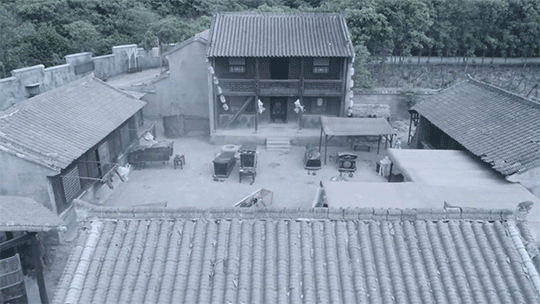
In this brief long-distance shot we learn that A-Qing sleeps in a coffin, which is some next level goth girl shit.
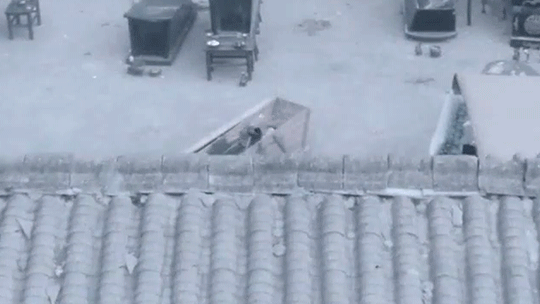
Soundtrack: 1. Hey Pretty by Poe 2. I Want Candy by Bow Wow Wow 3. Cheap Thrills by Sia
#the untamed#the untamed gifs#restless rewatch the untamed#yi city#yi city trio#canary3d-original#ep 38
157 notes
·
View notes
Note
Is Tav keeping her pregnancy secret still bc she thinks AA will be too controlling and wants to hang on to her independence until she has to tell him or?? Kinda wondering bc in the last chap she was thinking about how he hides things from her lol 🙈
Basically.
There's also the whole thing where she doesn't trust him anymore post-ascension. She loves him but AA asking her to sacrifice her mortality as the only way to prove her love for him cut her deeply. Astarion has also always been a touch of a liar, bending truths to fit the perceived narrative he wants to give off. She realizes that will be a struggle with him, too. Basically the whole situation will be work, if she's considering getting back with him.
At this point in the fic, she's trying to see if she can trust him again, and is considering that maybe she was wrong to immediately reject his offer to live out their days together in immortality.
She really doesn't know what to do right now and is trying to "feel out" which direction to go in. The obvious answer would be to leave him, but that was before she got pregnant. She didn't plan on getting pregnant, or even thought that she would. Tav really thought they could just have a casual relationship because, let's be honest, the sex with Astarion is amazing and who the hell wouldn't want that lmao. Ain't no shame in the girl wanting some good dick.
She slept with Astarion multiple times during their journey together and she never fell pregnant, likely due to him being a severely underfed vampire spawn. Because of that, she, nor he, realized this was even a possibility now. He still doesn't. Tav is at least trying to do what she feels is the right thing in this situation by giving their relationship a second chance. Astarion deserves an opportunity to be a father, but he has to come to his senses enough for that to happen. Anyone can make a child, but that doesn't mean you deserve to be a parent.
AA kind of looks at Tav coming back to him as a victory. That he played his cards well enough that she let him start pulling at her strings. He has a horrible need for control in any and all situations, and grows increasingly paranoid when things aren't going as he planned. He does not like being confronted about who he is or was, and is jealous of how much Tav cared for who he was pre-ascension.
To him, he doesn't understand why she can't accept him as he is now. He sees no wrong in what he did or the man he's become, as he did it in part for her. For them. To him, he's self-less in his endeavors. He'll burn the entire world to the ground if it means keeping her safe. He'll share his whole palace and all of his riches with her. He'll put her in the very best of everything; she'll have choice blood to drink everyday and will never know what it's like to be on the brink of starvation.
He will never tell her he loves her, as the word is tainted and in a way admits vulnerability, but he'll do his very best to show her. But he needs her to trust him in delivering her into the night. Trust him to make good on what he says, that the whole experience will go by in a flash, completely pain free. Entirely different from his experience. And they'll live out their eternal lives together with her forever by his side. They'll be the most feared couple in Faerûn, and have songs written about them.
Though until she agrees to let him do that, AA will continue to play his game.
Tav wants him to respect her decision to remain mortal if they're going to be together, even if it means she dies from old age. Because that's her decision to make. It's her life. Astarion shouldn't take that from her, or need that for him to accept her love for him.
But the thought of Tav dying or becoming old and frail terrifies him, because deep down he loves her. He's so deeply connected to her emotionally that the thought of her no longer existing one day shakes him to the core. It's a major fear he has (although he'll never admit it), that she will pass before he has the opportunity to turn her, or in his mind, "save her."
The TL;DR answer is they're two idiots who are still in love with one another but neither of them knows how to just come out and say it.
Hence, the events of Sonnet lmao. Hope this clarified some stuff for you!
23 notes
·
View notes
Text
2024 fic roundup
Thanks so much to @cheeseplants for tagging me in this Ask game!
The idea is you can answer these questions yourself, as many or as few as you want 💜
What fandoms do you write in?
Good Omens, baybeee 👈😎👈 I don't think another piece of media has ever quite so completely owned my ass. Well, maybe Sherlock Holmes (not the BBC one, sorry), or Due South (look, the tale of a misfit, repressed Mountie masking all the time? A neurodivergent hero), but I haven't written anything for them in yeeeaaars
How many words have you published in 2024?
141, 427, about half of that on Write A Way (Explicit) alone. Wow that's... huh. That's a lot...
What is your greatest achievement this year?
It's a tie between creating my first ever multi-chapter piece of work and joining @whickberstreetwriters 🥳 I'm extremely proud of Write A Way - I've had so many comments from people talking about how seen they've felt as neurodivergent people, not just in the common struggles but in our joys as well. It truly makes my heart full. Being invited to join WSWA contributed massively to me being able to feel confident in my writing again. Honestly, without their support, beta reading and friendship I do not think Write A Way would exist.
Top 3 fics you've written this year?
Have I mentioned Write A Way (Explicit)? A tale of two sparring authors, both successful in their own right, both neurodivergent... and both secretly fans of a certain show?
Then there's How to Play (Mature), where I really wanted to experiment with ramping up the sexual tension inherent to their 1941 shenanigans
Finding a Rhythm (Explicit) is one of my most recent fics and I thoroughly enjoyed writing Aziraphale's incredibly obvious seduction attempts while Crowley is incredibly oblivious.
What was your biggest pit of despair moment?
I don't think I truly had one, but there were a couple of snags. I guess for me it was realising a chapter in Write A Way just wasn't working and feeling a bit downcast. Work was stressful and the thing that was meant to bring me joy was causing me a headache. I wanted to have Azira and Crowley smooch in a way that felt natural, but it was really fighting me; it was only through the help of my beta readers that I was able to persevere and make those two twits snog
What have you learned?
Listen to your beta readers but also ask questions - I made way too many assumptions early on when I was getting used to having my work beta read. I've also learned that I can write long-form fics! I genuinely didn't think I had that in me
What fic did you want to do but never made it off the ground?
Do not look at the 5000+ word unfinished draft in my folder... It's been going around my head for a while, this idea of Dr Aziraphale going to a conference with his university colleague Dr Crowley and sexy shenanigans happening. Mostly involving thin walls and vibrator wands.
Did you beta any fics?
So many, you have no idea! I've done some for the GOAD Writers Guild, but the WSWA fics have been my core source. One of the things I love most about being in the Whickber Street Writers Association server is that we're a micro-community of writers and I get to beta some absolutely stunning fic. It's inspiring
What 3 fics have you read this year that you love?
Just 3? Gaaaah OK
I recently read The Apple Doesn't Fall Far (Explicit) by @cheeseplants - it was so sweet and lovely and it felt so grounded. I'm a sucker for fics that focus on two people not exactly fixing one another, but who just by being close inspire each other to be better
Show the Way (Mature) by @the-literal-kj is an incredible fic where Aziraphale and Crowley go to war during a community theatre staging of Hadestown. KJ really draws out some amazing, tender characterisation and I really enjoyed the bickering and progression as the enemies turn to friends then lovers
Last but certainly not least: A Wank in the Park by @rofell a story where Ezra and Anthony, both in their very early 20s, meet while working on a production of Shakespeare in the Park, forming a very believable and ridiculous friendship with benefits. I had the great joy of beta reading this and watching with mounting amusement as these absolute "turbo virgins" go into denial about the fact that their sexual experiments together are anything more than that
What ideas are percolating for next year?
See my Drs Aziraphale & Crowley mention 😅
Who do you want to thank?
Everyone at the GOAD sub for their wonderful support (and putting up with my meme posts). However, a very special thanks to everyone on the WSWA server - I truly could not have written half as much half as well without their help and inspiration
Feel free to take part, choose and ignore questions as you'd like, and here's to our world 🥂
9 notes
·
View notes
Note
i think david was a lot more like max as a kid but he softened the story he told to max nikki and neil in the car
thank you for the ask anon !! for your reference reading this made me grimace in a way that a wounded dog would upon seeing a piece of meat !! but seriously this is a topic that is very important to my personal and possibly general understanding of these two characters, so im just gonna say that i agree with you and such interpretation of david’s character is very easy to call accurate to canon as both david and max are written with obvious intent to be seen as parallels of one another, more so than they are written to be character foils.
max and david are set to be read as opposites in the show from the very start and i think this is also the easiest and safest way to perceive both of their characters if this shows meta doesn’t interest you. their standpoints and life views are seemingly removed as far away from each other as humanly possible and we are reminded of it more than necessary in the earlier content. the show tries really hard to make it look like david is an inherently good person put against max’s necessary evil, so it seems only right to view them this way. and yet the first two seasons of the show do a spectacular job at showing us that david is not at all as good of a person as he tries to be (not tries to appear, but tries to be, important bc first one is max’s perspective on david’s person while the second one is a description actually accurate to him). early seasons david is undeniably selfish and just as much of an asshole as max is, keep in mind that this is not my personal view on his character but a fact in canon that we are reminded of time and time again and is also something that gets lampshaded by the writers during the parents day episode. he pushes his positive perspective of the way things should be just as hard as max pushes his negative one, if not more, he behaves in his own personal interests instead of interests of others or the interests of camp constantly and guess who is the only other character in the show who does this just as often (the answer is max). the only reason why it’s not always easy to pin point this stuff is because they are constantly posed in situations that require them to act dissimilarly enough for it to create a contrast which isn’t always easy to pick up on as something intentionally vague and done for specific narrative purpose. this similarity extends onto the fact that they are both victims of abuse and the show is well aware of it and uses it to its own advantage. both max and david deal with their trauma in drastically different ways as seen by the way they talk about the world surrounding them, but the core of it is the same and that’s the important part of it.
so i believe it’s very safe to say that even if david didn’t say anything that would allude to him changing the story about his younger self to be nicer than it actually was, it sure was implied by the writers in the subtext of that episode, maybe in the subtext of the show in its entirety. early camp camp content surrounding these two based itself very heavily on david’s belief that his similarity to max is what will push this kid to become just like him in the future, so it really is not out of the left field to assume david was a lot more like max when he was younger. most probably because in many ways he still is just like him.
tldr; david sees himself in max in more ways than one and the show’s writing feels the same way because they intentionally wrote them to be as similar as possible. the writers rely heavily on these two being narrative parallels to make their characters work in the way they do so your headcanon is as real as it gets anon ^^
#nightmare#camp camp#david cc#max cc#is it obvious i tried my best not to dadvid out in this one#treating these two like they are not intertwined in my mind just so none of you get the found family ick.. mwah mwah
48 notes
·
View notes
Note
What do you think makes for actual interesting role-playing mechanics for a TTRPG?
The most fundamental thing I’d say is like. Having roleplay be mechanically integrated with the rest of the game.
I love Pathfinder 2, and it improves drastically over DnD in integrating roleplay, largely by allowing you to have mechanically fun characters in and out of combat, while DnD often makes you pick one. You make a lot more decisions during character creation and as you level, and have different types of feats that make it so you’re never choosing between one mode of play to have fun in.
However, it’s still mostly a combat game and doesn’t reallyyy have strong mechanics for roleplay, it’s more just kinda “you can do it if you want.” Like you can express your characters better mechanically with the good available toolset, but I feel that’s different than actual narrative mechanics.
The issue is that most of these big rpgs have a clear division between gameplay and roleplay, gameplay is what the rules are for and when you roll dice, and roleplay is a you doing freeform improv. That’s not inherentlyy bad, but…actually nah it kinda just sucks lol. If a game is designed with roleplay as a core part, it shouldn’t mechanically be an afterthought.
The obvious answer here is Powered by the Apocalypse games do a great job of it, and plenty of people have written very well how great they are.
I’ll instead highlight Lancer here, which is still broadly segregated between gameplay and roleplay, but it does it in a good way. You’re mech pilots where sessions follow a tight mission structure of brief, downtime, action, and then debrief.
In your downtime phase, you have more freeform play where you’re preparing for a mission, and can be anything from performing recon, to recruiting locals to help in a mission, to convincing another pilot to lend you their cool gun for the battle. There are rules but it’s kept loose.
What I like about this is rather than doing the standard “roll Deception to lie to them,” you do one roll for the whole downtime activity, and you use Triggers instead of stat numbers, and these are things like your background or something you’re particularly good at, like “show off” or “get a hold of something.” Triggers can be invoked to get you bonuses or penalties depending on a situation.
The important part is, there’s variable fail-states, and most commonly, you’ll be able to get what you want, but at a cost, like “you can hack into this database, but you’ll need to frame an innocent employee by using their work ID.” Being forced to make hard choices rocks, and having the agency to MAKE those choices is what drives good roleplay.
TL;DR is that having a way to fail forward and make failure interesting drives compelling roleplay and is a great way to integrate narrative agency for players into rpgs. Games shouldn’t be split into gameplay and roleplay, they should be integrated and have no hard line between them. It’s almost always more interesting to, instead of saying “you can’t do this,” say “you can, BUT at this cost”
31 notes
·
View notes
Text
Patlabor is On Lock
12 Days of Aniblogging 2023, Day 3
While Gundam is the most recognizable mecha anime I got into this year, most of my time was really spent working my way through the Patlabor franchise, and it’s quickly become one of my favorites. I’ve always loved the quiet moments in mecha shows, which makes sense considering I started with Macross and live for the bridge bunny gossip and off-duty downtown hangouts. Patlabor is built with this downtime at its core, operating with more of a slice of life mentality than anything else.
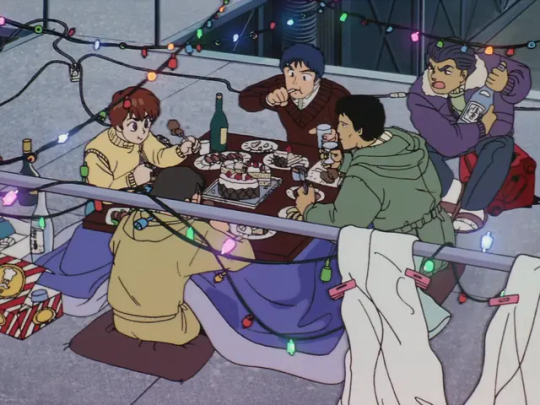
A lovable cast is crucial for making this work. Thankfully, Noa Izumi is a wonderful and unique protagonist, a scrappy soft butch who’s in it for the eroticism of the machine. The first Patlabor opening is a love letter from Noa to her mecha, and I get it! The AV-98 Ingram is an iconic design, with its asymmetric bunny ear antennae and shoulder lights and comically oversized revolver that requires the right hand to pop out in order to draw, exposing the arm wiring in the process. This is a show clearly written by first-generation mecha otaku, and plenty of time is dedicated to showing how the Labors have to be transported and recharged, how the movement software depends on reinforcement learning, showing off corporate model revisions, and of course repairs in the hangar.
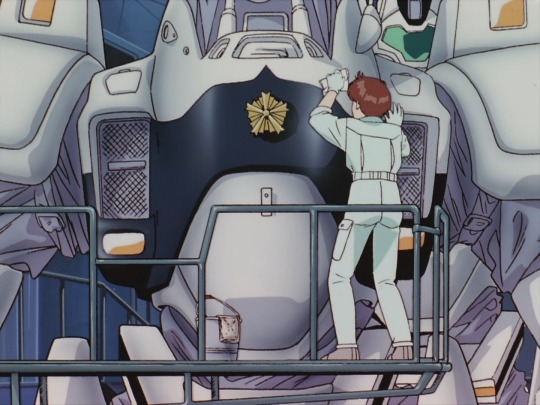
Going back to the human characters, Noa’s work partner Asuma is clearly the more passive one within their dynamic, and it’s sweet to see that played out sincerely. And then there’s Kanuka Clancy, the stern weirdo badass from New York who’s constantly swearing and dropping one-liners in English. She’s the obvious breakthrough character of the show, and also the perfect opposites-attract pairing for Noa if you’re the kind of person whose yuri meter went off the charts during their drinking contest episode. Most of Patlabor’s cast seem fairly one-note at first, and one of the great tricks of the show is giving them just a little bit more depth than you would expect. Pretty much everyone, even the most jokey characters, eventually get a standalone episode or two that further sketches them out and offers real interiority. Captain Goto is another fan-favorite, and it’s definitely his mixture of laziness and wicked perceptiveness that does it, plus his main character billing in the movies.
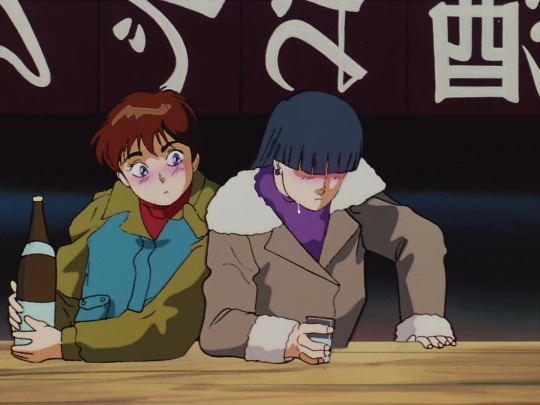
SV2 may be a law enforcement unit, but this really isn’t a police procedural at the end of the day. These guys are the bum department out in the sticks who everyone hates, and the upside of that is that SV2 gets stuck with the oddest of jobs instead of cop work. Sometimes that’s dealing with a runaway military prototype, other times it’s arguing with the insurance company. The best kind of episodes are the ones that take almost entirely on base as everyone tries to solve a problem of their own making, like an Ingram falling into the sea or the mechanics getting into a fight with the only restaurant that delivers to them.
A main plot does eventually emerge, with a shadowy company developing a mysterious jet-black Labor piloted by a child who is the girlish boy to Noa Izumi’s boyish girl. The Griffon is sleek and curvy and has superiority in the water and air – it’s a machine designed to defeat Ingrams, and I wouldn’t be surprised if Yoji Shinkawa looked here when designing Metal Gear RAY. Automation is a fundamental ideological enemy of mecha – faceless mass production and artificial intelligence mean an end to the era of personal combat. Even Patlabor, a warless series, dips its toes into this idea in the later episodes, with Noa and the mechanics alike worrying that the neural networks in their new Labor models will make them redundant.
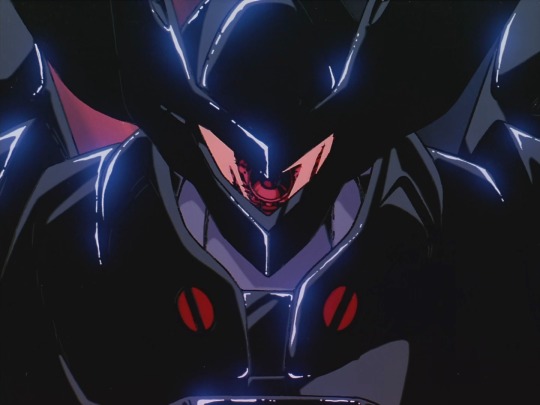
Overall, this show is hilarious and sweet and clearly loved by an older generation of otaku. So why didn’t I hear about it earlier? Partly it’s on me for not hanging out with the right mecha fans online for a while. But if I had to guess, it’s also because Patlabor is one of those works that’s straightforwardly, unobjectionably good in a way where it already says everything there is to be said about it. You can have near-infinite arguments about Zeon ideology or mobile suit powerscaling online, but there’s only so many times you can say “yeah, Noa Izumi, love that girl” precisely because everyone agrees. It can also be hard to pitch things by their vibes in a genre known for adrenaline and intrigue. Patlabor’s vibes, for the record, are immaculate.
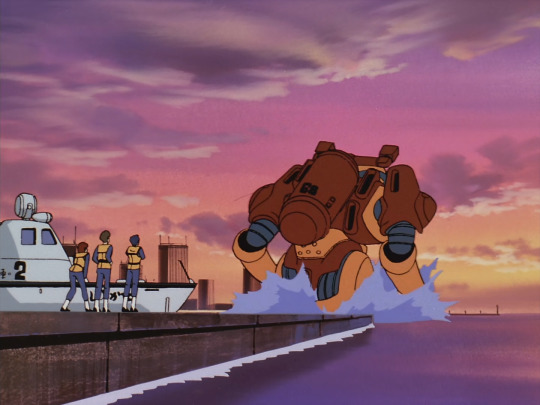
I'm probably gonna be chasing the high of cel-era sunsets forever
Mecha’s also a bit looked down upon from the outside. Anything that makes it into the larger conversation has to be understood as “elevated” or a “genre deconstruction”, even if the very first Mobile Suit Gundam is already about Amuro’s trauma and PTSD from being made into a child soldier. This elevation is actually happening to the second Patlabor movie as we speak - it’s becoming increasingly discussed as a major component of Mamoru Oshii’s filmography, divorced from its source series and instead compared to his subsequent Ghost in the Shell movie. Funnily enough, Oshii’s contributions to the Patlabor TV show are actually the more lighthearted gag episodes.
A lot of recent Patlabor retrospectives have drawn attention to the artist’s collective Headgear, established and owned by the series creators so they would be able to retain the rights for the franchise. This structure is fairly unique for the anime industry and probably only makes sense for established creatives, but it does seem to have worked out great for them, providing financial stability and strong creative control over the franchise. This allowed Patlabor to thrive in the relative wasteland of late 80s TV anime, a time when even Gundam had fled to the OVA market.
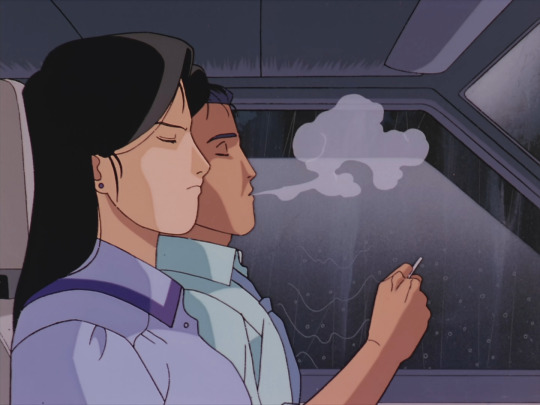
That being said, it does take Patlabor switching back to OVAs to truly spread its wings. The New Files are a conclusion and continuation of the TV series that are willing to move at their own pace, resulting in some dramatic and surprisingly thoughtful stories. It’s genuinely touching to watch Goto and Nagumo try and fail to communicate their feelings for one another in a very restrained episode as thick with long-stewing emotions as it is empty space. Of course, the very next episode has half the cast get stuck in the sewer labyrinth underneath their base and there’s a bunch of Wizardry references. Oh, Oshii.
The Patlabor movies fully lean into this melancholy and uncertainty, and it’s a welcome evolution for the series. The first movie still ends with an all-out action set piece in a half-built mecha factory that stands in for the Tower of Babel, but the second one stays serious the whole time through, going as far as pivoting to a more realistic artsyle. It’s a challenging film. The politics are all-encompassing but fairly straightforward, as Oshii effectively infodumps a presentation on the postwar history of the JSDF throughout. Instead, what the makes the movie so difficult is its willingness to face the end of an era – the Cold War is over, the bubble economy has popped, and the former members of SV2 have all gone their separate ways. The conditions that have created Patlabor, both internal and external to the show, have dissipated. And the movie makes it clear by having the military stage a raid on SV2’s headquarters, tearing their Labors to shreds with gunfire in a beautifully animated act of desecration.
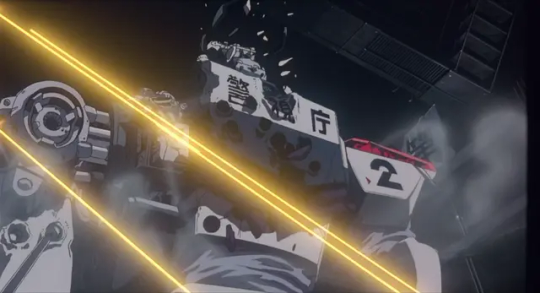
After watching her be a lovable mecha dweeb for 50 episodes, it hurts a bit to hear Noa Izumi say that she doesn’t want to be that girl obsessed with robots for the rest of her life! These characters are growing in such a way that will remove them from the focus of the narrative, and it’s a movie about letting go just as much as it is about looking towards an uncertain personal and national future. I love Miyazaki’s Porco Rosso, but the fact that Oshii put this out just one year later paints a delicious contrast between the two directors with regards to escapism versus reality with regards to militarism. There's some great interviews from the era where they're just taking potshots at each other about all this.
20 notes
·
View notes
Note
I love seeing Degrassi on my dash! I feel like I never got a great handle on Zigs personality and would love to hear your thoughts. Like I can’t even really say if he’s an introvert or an extrovert. I get that he was sort of supposed to be a bad boy who’s not all that bad, sort of like Sean except smoother and with better social skills, but a lot of times Zig just seemed kind of bland? I hope it doesn’t sound like I dislike him - I just don’t have a handle on his personality! And I’m with your anon who’s first watching in how much I hate that Zaya’s first time was while they were on drugs. Ugh.
First of all, I am angry. I had a whole response typed up, but then I accidentally refreshed the page.
Anyways, I'm glad you're loving seeing Degrassi on your dash!
As for Zig, I think he's an ambivert. He seems to enjoy social interaction and likes being around others, but he's also surprisingly quiet at times. As often as Zig is the one to lead the conversation and vocalize his thoughts, just as often he keeps to himself, sometimes practically disappearing from the scene depending on his scene partners. When Zig is around more extroverted, dominant people with bigger personalities such as Tori and Esme, he allows them to lead the conversations, hardly weighing in as the couples (Zig/Tori, Zig/Esme) interact with others. But when Zig is around someone like Maya, Tiny or even Grace (who is much more introverted), he's more talkative. The times where Zig is desperate not to be alone, it's more about his abandonment issues than it is Zig needing the social interaction itself to be content.
The thing about Zig is that the writers had different ideas about who they wanted his character to be. Season 11 was kind of Zig's blank slate era. He had zero personality traits beyond the love triangle with Maya and Tori other than being a skateboarder. In season 12, we got to know Zig a lot better. That's when it becomes clear that though Zig can be charming, he's actually a deeply insecure person, not wanting others to know he comes from a poor background. Though he makes a lot of mistakes, he always means well and will do what he can to make things right. Season 13 kind of flipped the script a bit. We missed out on seeing the transition from more innocent skateboarder/band member Zig to "bad boy", gang member Zig. It was as much out of the convenience of doing the bad boy vs good boy/poor boy vs rich boy dynamic for Maya's heart (Zig vs Miles) as it was creating intrigue about what had transpired in Zig's life while we were forced to watch most of the characters in fake Paris. This reset allowed Zig to be written and framed as a more rebellious character, something that mostly follows him through the next six seasons. But ultimately, I don't think Zig ever changed all that much or was lacking in personality. I mean, I would have loved to have known the details and seen the major beats of Zig getting recruited into the gang, dealing drugs, literally being kicked out of his home after his mother and brother were almost killed due to their association with him, and then being homeless for a while before finding the abandoned house. But Degrassi hates poor people TBH, and they wanted to show off their fancy, Hollingsworth set so there could be pool parties during all four seasons of the year. I'm clearly not still bothered by this, though. Anyways, Zig's core insecurities and sensitivity remained. His bad boy image was a façade. But at the same time, the months of his life the audience missed turned Zig into.. a darker character? I wouldn't say that's the best way to describe it, but I think Zig grew up a lot during that time and witnessed a lot of things he shouldn't have. He found a way to cope with being a literal teenage gang member and adjusted his behavior accordingly. At the same time though, Zig has obvious tells when he's "faking" it. When he's being more loud and over the top, insisting that he doesn't care, that means he probably cares about that person or thing above everything. Season 13 Zig was basically a wannabe. He was desperate to fit in, so he molded himself into being the type of person who looked the part so that he could get the validation he needed and feel more confident in himself. This aspect of Zig fades away fairly quickly once his friendship with Maya is back on solid ground, but there are still remnants of it later. Towards the end of season 14, Tiny, Zig's own best friend, is under the impression he isn't a virgin. Tiny isn't an idiot and Zig spent a lot of time being invested in and pining for Maya, so he must have gotten that impression from somewhere. But by season 14, I feel like Zig has undergone a lot of character growth and become more responsible, sensitive and selfless than he ever was before.
Next Class did yet another reset with Zig. By that point, the show had fewer episodes, resulting in many characters being driven by plot more so than characterization. Zig's character got kind of muddled because they wanted to subvert expectations about Maya cheating on Zig with Jonah only for Zig to do this with Zoe. He's yet again deeply insecure which isn't out of character in the slightest, but the reasoning behind why Zig loses faith in Maya and the timeline for how this plays out just.. doesn't add up? It's clear it was something that needed to happen by the end of the first ten episodes, so they awkwardly fit it in seven episodes in to tie the bullshit arc together. And also, Zig was dumbed down. The Degrassi writers are very comfortable dealing with the same archetypes. They love a good goofy, clueless, himbo type. They originally had Spinner for this, then gradually turned Drew into this type after season 10 Drew had been much more ambitious and cutthroat. As a result, the rest of Zig's time on the show following his breakup with Maya mostly involves him fumbling everything and making the worst possible decisions at any given moment only for him to learn his lesson at the end of the episode. Until season 4 where he mostly got his previous character development back just in time to put him back together with Maya for good.
Wow, I don't think I answered your question at all. I went on multiple tangents. But even though I criticized the writing and accused the writers of switching up on Zig based on the new eras (season 13, Next Class), the truth is that I don't think his personality went through that much of an overhaul. I always felt that he was the same insecure, well meaning, loving, silly guy during all of his seasons. He deeply loved and was loyal to those closest to him. There were plenty of instances where he could be surprisingly intuitive, able to give the perfect advice for the situation literally just by being empathetic. But at the same time, Zig was also a hot mess. He had a lot of problems that the writers basically never acknowledged or downplayed (abandonment issues over his parents basically disowning him when he was 15, chronic self worth problems that he never properly dealt with). His positive qualities could easily become negative qualities depending on the situation. He could be thoughtless and unnecessarily aggressive in the name of protecting himself or others. But at the end of day, Zig was just.. good. I can't help it. I always loved him, and I think there were far more good moments for him than bad.
As for Zaya's first time, I weirdly liked it? My logic is probably skewed, but I always loved that Zig and Maya's relationship was imperfect. It made them feel more real. They suffered from bad timing and made questionable decisions, but ultimately loved each other enough to overcome all that. What was important is that they were able to have a conversation about their regrets and come to an understanding, bringing them even closer. Plus, their second time went much more smoothly. ;) Also, my take on this is probably because the Eli/Clare relationship had dominated seasons 10-14. That particular couple was romanticized to a ridiculous degree even though Eli and Eclare were never anything but toxic waste.
#Zig Novak#Anonymous#Long post#I'm so sorry#I have a lot of thoughts#My first attempt to answer this was much more concise but unfortunately you're getting the messy rambling second version
10 notes
·
View notes
Text
Vietnam and Star Wars
Okay, y’all, I’m not going to write an entire essay just yet, but I don’t think we talk enough about the Vietnam war and how strongly Star Wars was influenced by that conflict. I’m sorry for the following incoherent ramblings...
I would like to organize my thoughts about this, but I think there is so much to be discussed about this. I am currently taking an American Literature course focused entirely on the Vietnam war. Plenty of scholars out there have already written about the connection of Star Wars and real world conflicts. We all know the Empire and The First Order are based heavily upon Nazi Germany. The term “stormtrooper” is a literal translation of the original Nazi militia that helped bring Hitler to power. The uniforms, the helmets, and so much more in the movies and shows allude to real world militaries in order to help viewers identify the “good guys” from the “bad guys”. Of course, if you put photos of the Rebels and the Resistance fighters next to real US military pilots and soldiers, the similarities in uniform are pretty obvious. But I really think we need to look at Vietnam and The Clone Wars in particular.


I’m sure most American and some non-American will recognize this kind of monument. Coming from an American who is entirely unfamiliar with different War Monuments throughout the world, this particular scene seemed to specifically call upon the Vietnam Memorial in Washington D.C. That seems pretty obvious, but I would like to look much deeper into this. George Lucas began writing the scripts for Star Wars during the Vietnam War, and although in the beginning of the war there was plenty of public support for American troops to be sent in to Vietnam, by the time George Lucas began writing Star Wars, the G.I movement and Kent State protests would have already been in full swing.
(I don’t know how many of you guys knew this but George Lucas is actually 79 years old and would have been the prime age to be drafted to fight in Vietnam. A few sources I am finding say that he was exempted because of diabetes.)
My point is, at the time that George Lucas wrote Star Wars, the United States was in turmoil (The Civil Rights Movement was also stirring up a lot of unrest amongst the general public). I want to go further into this later, but while the original trilogy echoes themes found in World War II, the Prequels have so much to do with the Vietnam war, especially when looking at Order 66 and how the lore has been expanded upon with shows like The Clone Wars and The Bad Batch.
Vietnam was the first war that the United States lost. Ever. (I’m talking international wars here) And that loss absolutely shattered the perception that the general public held of the country. We were undefeated. We were untouchable. We thought we were hot shit. By all calculations, the United States should have won the Vietnam war, so when a small nation such as Vietnam managed to overthrow one of the most powerful nations on the planet, the US and it’s citizens were shaken to the core. That was a lot more history than I wanted it to be. I was meaning to talk more about the fact that the prequels and the use of Palpatine, the Empire, the Republic, the Clones, and the ambiguity of it all so strongly mirrors a lot of the nuances of the Vietnam war. American soldiers fighting in Vietnam were becoming increasingly aware that they were not in Vietnam to defend freedom, but to dominate. American soldiers were unwelcome in Vietnam, and when they returned home, they found that the general population wanted nothing to do with anyone who had served in the war. I look at that and I see so many similarities between the movies, shows, and real life..... I said this wasn’t going to be an essay, but oh my god I just feel like there is so much we need to talk about!!!
#star wars#the clone wars#george lucas#the bad batch#My Star Wars Vietnam TedTalk#Guys we NEED to talk about Vietnam and Star Wars#like we NEEED to talk about it#I will explode if we don't talk about it
22 notes
·
View notes
Text
Patterns I Notice In (Male) Reviewers of Childrens Media
You know, I've started to notice something.
I've been watching a lot of movie reviews lately, not limited to children's movies but still a lot of children's movies as obviously children's literature is my main focus as a writer.
Remember how in my post where I talked about how Ruby Gillman showed some of the wrongs in children's media today and I had a back and forth in the comment section with someone who pretty much slammed Ruby as bad but as we talked more and more they ended up being like, "It's just not my cup of tea," as I pointed out his/her core issues with the movie was just personal opinions?
These past months, I became a bit more familiar with reviewers who will just claim a movie is bad if it doesn't comes with profound philosophy and/or not their cup of tea and I actually noticed a pattern.
In regards to the people who use their real voices in YouTube videos or the authors listed in review articles, its mostly men who will downright claim a piece of fiction is terrible based on their opinion instead of wether the story is approaching subject matters in a harmful manner, etc. I barely see any women acting like 'I hated this movie, so should everyone else'.
An obvious example that comes to mind, is Monsters vs Aliens.
To me, it's not a masterpiece either and there were definitely a writing decision or two that was made poorly. However, I don't think it has earnt the label of bad or terrible whilst I've heard/seen multiple men call this movie as such.
On an entertainment level of value, does it entertain kids? Yes. As a kid I thought it was okay at its worst, good at its best moments.
Does it have a harmful message or premise? No.
Are the minor storybeats problematic or unrealistic? No. In fact, Derek breaking of their engagement not only mirrors insecure men threatened by more powerful women but it also mirrors some of the douchebags people who developped a terminal illness or disability have dated. Because of the many ship edits, I know not a lot of people actually know the story behind Arcade, the Eurovision hit by Duncan Laurence.
In ship edits, this song often gets used for tragic ships or doomed star crossed lovers, but it's actually about having wasted everything for a relationships that is not worth it and that is the key part of the song people always miss. You see, the story behind the song is this;
Duncan Laurance had a friend who was diagnosed with cancer and she had no chance for recovery. Her boyfriend, rather then being there for her in her final moments, broke up with her and she spent her final days, lovesick on her deathbed waiting for him to come back but he never did. Duncan wrote the song in her memory but also to be a cautionary tale for himself, to never become the idiot wasting their final moments on a asshole who left you to die with a broken heart!
Susan and Derek reminds me of that story, because men like Derek would have also left Susan if he found out she was terminally ill or got into an accident that left her disabled.
So the movie's storytelling isn't downright terrible by any means and the animation is also decent. But again, I've heard multiple men take a dump on this movie for being trash.
I'll admit my brain is too foggy to remember how well the other monsters were written but considering the main story rested on Susan's shoulders and that was told acceptable enough and they gave her the self-acceptance she needed, how well they are fleshed out isn't too much of a deciding factor wether its good, okay or bad when it comes to stories aimed at younger children.
How well characters outside of the protagonist are developped and how important that is to the overall story really depends on the age demographic as well as the kind of story at hand. The more characters a child is meant to empathize for and follow their direction during the story, the more difficult it is to grasp for the really young ones. Small kids prefer having one fleshed out protagonist with a weaker cast over every character having a deeply developped backstory. Flat side characters are a thing in children's media for a reason.
Shows have a somewhat unique position for their ability to flesh out the characters because they have way more time to tell the story so they can easily create a filler episode where a background character shines even if its meant for a way younger audience and it also has the option to have the characters grow and become semi-fleshed out alongside the viewer if the show gets popular enough for a long-run.
In the case of a slightly older kid demographic, this can lead to fully fleshed out masterpieces like ATLA, though not every kid show should be on their level for us not to bash the property. Brain dumb entertainment can still be a masterpiece in a kid's eyes and could lead to them becoming a long-time fan for nostalgic reasons.
What we should bash, are harmful kids shows like Cocomelon who's animation was literally proven to be too fast for a young kid's brain to follow hence the infamous Cocomelon zombie-kid and the Cocomelon tantrums became a thing, because their brain speed has adjusted to a speed faster then real life speed. Anyone who listened often to Nightcore and then went on to listen to the original version, likely encountered this effect with the original song suddenly sounding slower then you remember it- thats your brain speed having adjusted to the Nightcore version.
I couldn't believe my eyes when the far right recently turnt on Cocomelon because of there being some LGBT episode, when Cocomelon was already proven to mess up a kid's brain speed and in kids with brains that are still that lacking of development we don't know how much fucking with their brain speed will lead to in their development. I saw parents turning away from that show during the Pandemic for this very reason so I was flabbergasted so many parents on the far right still let their kids watch Cocomelon in the first place!
It's cheaply made harmful material and I was quite literally fuming with all the stupid parents saying 'God, I really have to keep in mind what type of content my kids consumne', like yeah no shit Sherlock! The fact your kids were still watching all of it after the many controversies, proved you never cared about the quality of media your kids consumne in the first place, don't pull that stupid Pikachu face! The fact LGBT content is the straw and not the actual harm this show does to children's brain development makes me want to punch someone in the face.
Can male reviewers please start targeting the actual bad children's movies and shows and not shit on movies who simply didn't managed to strike the gold of a masterpiece in storytelling and possibly animation? If someone were to force me between watching Dreamworks' Trolls franchise the entire day over and over again and just one hour of Cocomelon, I'd still pick Trolls in a heartbeat.
Because watching an okay is always more better then watching a movie/show that actually deserves the label terrible.
#tetsutalk#writing#critics#reviewers#a trend I noticed#monsters vs aliens#trolls#dreamworks trolls#cocomelon#that a story isn't a universaly regarded masterpiece doesn't make it bad#harmful content is actually bad#brain speed#actually look into the shows your kids watch#don't blame it on the LGBT#Cocomelon has always been a cancer#arcade#the origin of the song and how everyone misuses it
6 notes
·
View notes
Note
ok hi the anon who did the long rant about riko's role in the narrative returning because your comparison with riko and homelander just hit me who riko reminds me of so much, and i'm going to go full anime nerd and talk to you about yugioh zexal and iv (pronounced four). because iv is a lot of what riko should have been in my eyes. he is only around for a handful of episodes, is rival to the heroes so is never allowed to win when it actually means something, but the writers knew exactly what they were doing with him. a masterclass in quick and effect characterisation of a charismatic, media darling champion who's actually just really pathetic and lashing out at everyone because his dad is an insane alien child (that makes sense in context) and who is also an actual threat. and a lot of this is because the writers did what nora didn't and leaned hard into both aspects of him. even in a world of ham like yugioh, iv is one of the biggest, fanservice is literally his motto, and his performances are so over the top. they let him lean fully into his media persona and charm and show us him doing that, and how well it fools everyone to the point where the heroes and their friends actually start to sway to his side over their other friend who has history with iv's worse side. and when he snaps into villain mode he is in full villain mode, digging into people's weaknesses, toying with them, having carefully laid plans in duels and out to let people think they're in control when they've been doing what he wants from the start, torturing people's 8yo little brothers in front of them. and then when he gets pathetic he gets really pathetic and loses him temper and that is his trigger to let his plans fall apart, because his dad doesn't trust him despite being the only one left standing and the most capable and having given up everything to become the best and fulfil his father's plans for him, he literally set a girl and himself on fire one time because his dad told him it was for the best, and his dad still chooses someone else in the end, iv's temper snaps and he start making obvious misplays to drag out the torture when he could have won cleanly. now admittedly iv gets a full redemption "arc" (read: three episodes where hey he's on our side now because bigger threat) in the second half of the show, but he was beloved well before that and his only moment of redemption during the first half was a single line asking the heroes to save his family before disappearing for the next fifty episodes. and this feels so much like what riko could/should have been. someone who could play the media, who was fun to watch, who could formulate reasonable plans and who was in the end done in by his own flaws, and with a clear core motive, even if it's complex in how it's shown.
Can't believe villian expert anon just suplexed me into watching yo hi yoh in year of 2024. I read this whole message on one breath and it truly sounds amazing.
Just this is also what we are missing because this is what the fanfiction could have been but instead all works of fiction in this fandom boil down to making him not only bad person but also badly written character.
5 notes
·
View notes
Text
In Defense of Aziraphale's Decision
co-written by Sam H. and Aero S.
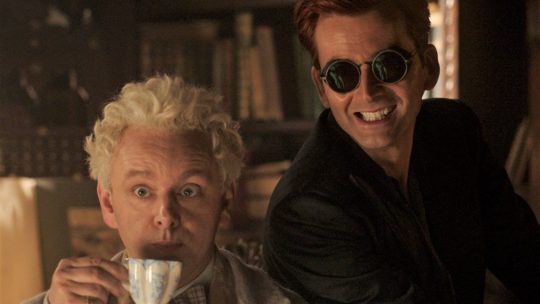
Read on our site!
After watching season 2, plenty of Good Omens fans flocked to social media to threaten Neil Gaiman for writing such a heartbreaking finale and curse out Aziraphale for choosing to leave Crowley behind to become the Supreme Archangel of Heaven. Of course, we might be biased in defending Aziraphale because we love him dearly, but there’s a core logical reason why his decision makes sense, even if it is a frustrating one. It’s no use trying to make excuses for his actions or even coming up with alternatives as to what actually happened in the show, as the motivation for what he did is understandable and something many people can relate to.
At its core, Good Omens is a show about morality and choice, and this only becomes more obvious during season 2. With the show’s thesis in mind, we can analyze how the entire season 2 has been constructed around these themes, and an additional theme of guilt, to cumulate into Aziraphale’s decision in the finale and how the finale of season 2 makes sense narratively and characteristically.
While this article is meant to defend Aziraphale and thoroughly explain his motivations, it’s also important to remember that this is our interpretation of Aziraphale as a character and Good Omens as a whole. Some people online may have different interpretations, and those can be valid too. Art like Good Omens, which explores a multitude of topics that are easily relatable to people, can be put into different contexts and, therefore, interpreted differently from person to person. The explanation we’re providing is our interpretation of the show from our perspective – we do this not to force people to agree but to offer our two cents into the discussion. We are not here to put down anyone’s theories or opinions (as much as we would love to) but to add more context to the show and engage in the conversation surrounding the finale.
Morality
“Even the children?” is a question that has been asked about Heaven’s decisions in both season 1 and season 2 during pivotal moments that reveal how Heaven may not be as entirely “good” as they claim they are. In the Job minisode, “A Companion to Owls,” the theme of morality is explored thoroughly by investigating the story of Job. The minisode illustrates how Heaven’s perceived benevolence actually brings great grief upon those they believe they are saving, highlighted specifically during the scene where the angels convince Job and his wife that replacing their three existing children with seven new ones is something to praise God for, and not something to mourn. Additionally, God, the all-mighty being who seems to have infallible logic that Heaven must unquestionably comply with, places a bet on Job that requires him to go through ruinous trials to prove that he will forever believe in God, even in the hardest times. This forces the viewers to question the saliency of intention, result, and values on the side that claims they are unequivocally good.
However, the main question of morality addressed in the minisode is told through Crowley and Aziraphale’s actions. Crowley tries to appear tough and ruthless by wrecking Job’s life by destroying everything he has and loves, including his goats and children. However, Aziraphale believes that Crowley isn’t as heartless as he seems. His suspicions are confirmed when Crowley reveals that he didn’t actually kill the goats and children and even goes so far as to ensure that the children return to Job safely. This softer side of Crowley reveals that just because he’s a demon, that doesn’t mean he’s inherently bad and that being evil looks a lot harder when there’s the presence of empathy. It’s up for interpretation whether Aziraphale believes this because of the fact that Crowley had once been an angel, too, or if he simply believes the best in everyone, even if he ostensibly claims that all demons are bad and all angels are good. Either way, this illustrated that the choices people make are not always based on who people think they should be but rather who they actually are, even if it is in defiance of their community’s expectations. The bottom line of Crowley’s character is also said in this minisode. When Aziraphale confronts him about saving the goats and children and asks if he was truly on Hell’s side, Crowley admits that he’s on his own side and goes along with Hell as far as he can. Unlike Aziraphale, Crowley is sure of the extent of his morality and feels liberated by his free will. He has been at peace with the fact that he doesn’t really belong in Hell, which has been established in the show’s first season when he says he Fell for asking questions and hanging with the wrong crowd. While he still insists on upholding his demonic reputation, he still wholeheartedly does good deeds, not because Hell or Heaven told him to, but because he knows it’s right.
The tables turn when Aziraphale is forced to confront whether he’s really as good as he claims he is, especially after he gives into Crowley’s temptation and eats food for the first time and then lies to Heaven about Job’s children, swearing on his angelic status that the three children are not his original children. Then, when Crowley finds him again, Aziraphale believes he’s going to Fall for lying, but Crowley tells him he won’t because he won’t tell anyone it ever happened. Still distraught, Aziraphale asks about what he truly is if he isn’t a pure angel anymore. Crowley echoes what he said about being on his own side, which is a much more isolating and lonely experience than he had made it out to be. Morality has become such a focal point for Aziraphale and Crowley’s existences to the point where they feel a loss of identity due to the uncertainty of whether their actions are morally right if it protects peace, a debate for humanity as old as time but a nonstarter for everyone else in Heaven and Hell. On the rock, facing the sea, Crowley repeats a line he had said the night before, but about Aziraphale: he’s just an angel who goes along with Heaven as far as he can. The loneliness that comes with their position has effectively alienated them from their respective head offices but also becomes one of the reasons why their existences are so intertwined with each other from this point forward.
The theme of morality is continued in the storyline of Maggie and Nina. The question of whether it is right for Crowley and Aziraphale to mess about in their lives even though Maggie loves Nina and Nina needs her gentle love after dealing with a toxic relationship is even explicitly addressed in the finale. Is it right to do something with good intentions and get the end results you wanted but not without putting those involved at stake? That large question remains unaddressed and hanging in the air for season 3 to attempt to answer.
Morality is often presented as black or white, good or bad, when in reality, it is much more like “shades of grey,” in the words of Crowley and Aziraphale in episode 4. They grapple with this during the body snatching minisode, going in circles about whether it’s right to dig up bodies if it's for survival or scientific advancement and what actions are justifiable as punishable. The punishment part is rather relevant because punishing someone is an inherently evil act; yet, if the intentions are good or protective, there is room for justification that it is morally correct. But the fault here is presenting the idea that being morally correct is the same as being objectively correct because perspective matters.
Ultimately, throughout all the flashback scenes and reflections presented in season 2, the show puts forth its thesis that the option of being either good or bad is a false dichotomy that systemically allows the justification of actions without considering the nuances and removing empathy and understanding from the equation. In this series, Hell and Heaven, especially, are the perpetrators of this false dichotomy, while Aziraphale and Crowley are attempting to grapple with the consequences of this polarity and trying to unlearn what they’ve believed all their lives.
Unfortunately, they aren’t quite at the same stages of the unlearning and healing process yet. From an external perspective, Aziraphale’s decision to become Supreme Archangel is harmful because he’s leaving behind the being he loves and possibly contributing to the destruction of the world. But from his perspective, it’s good because it gives him the opportunity to change Heaven’s faulty system and gives Crowley a chance to fully embrace his “good” side without being conflicted about appearing evil. His failure to recognize that this false dichotomy of good and bad is imperfect is the show’s way of proving–with the subtlety of hitting viewers on the head with a brick–that morality is not as simple as it seems.
(And it would be great if fans realized this too and stopped dogpiling on Aziraphale!)
Choice
When we refer to Aziraphale’s decision to return to Heaven, the keyword we need to consider is “decision.” Many fans have already started theorizing that the coffee that Metatron offered Aziraphale was spiked and that Aziraphale was coerced to say yes to his offer because he was essentially drugged. While there’s no saying whether this theory is right, if Aziraphale was truly drugged, it would make his decision to leave less emotionally powerful. What is the most painful part of the whole ordeal is that Aziraphale chose to leave Crowley out of his own will
However, it’s important to discuss how he was still manipulated into his decision. The Metatron knew that Aziraphale wouldn’t say yes to his offer if he didn’t bring Crowley into the equation (Aziraphale even says, “I don’t want to go back to Heaven” before the Metatron mentions Crowley). The glare the Metatron shoots Crowley as he walked out of the bookshop indicates that he knows that Crowley doesn’t want to go back to Heaven either, even if it's with Aziraphale. He essentially sweet talks Aziraphale into accepting his offer by acting as though he and Aziraphale are one of the “good ones” out of the batch of rotten apples when really, Aziraphale has never really been part of that batch at all, and the Metatron is perhaps the most rotten one out of all of them.
People must understand that the Metatron’s five-minute conversation wasn’t the sole reason Aziraphale had been convinced to rejoin Heaven but rather the cumulation of all the manipulation he has experienced for thousands of years; the factor of obligation to a harmful community is something that’s also heavily at play. The term “cycles of abuse” is often applied in a familial context, but it’s not addressed enough in a community context, even if it is just as common. For people to understand Aziraphale’s decision to return to Heaven even though they treated him like shit, they need to first understand what it’s like to live in a toxic community while also loving that community.
Aziraphale fiercely loved being an angel because he felt that was a large part of his identity, and therefore, the community in Heaven was a constant force in his life. Even if they treated him horribly, he always believed that they always did it out of love and goodness. That shouldn’t discount the fact that they always made him feel small or treated him horribly, but in Aziraphale’s mind, he could excuse their behavior if it meant he could belong.
Upon escaping from that community, Aziraphale struggled with finding his identity and what it means for him to no longer belong to where he had always been told he should be. So, of course, if there’s a chance for him to rejoin that community and hold enough power for them to love him without hurting him, he’ll take it because, with cycles of abuse, it’s impossible to fully ever abandon the community that has deeply hurt you without hoping that maybe they’ll change one day to love you and accept as you are. And since Aziraphale has sacrificed so much to appease the angels, it only makes sense to make one last insurmountable sacrifice to finally belong in the place he has always felt alienated from, even though he knows he’ll probably end up getting hurt again.
Additionally, Aziraphale conflates forgiveness with love because he’s great at forgiveness but not so experienced with love. When he allows Gabriel to stay in the bookshop even though Gabriel had mistreated him for centuries, Gabriel tells him, “I love you.” Obviously, Gabriel doesn’t mean it in a romantic context (and he may not have even understood what that phrase truly means in the amnesiac state he was in), but it’s likely that Aziraphale interpreted that phrase as “I forgive you,” and that because Gabriel no longer held a grudge against him for stopping the end of the world, he felt like he could be safe in Aziraphale’s presence. Again, this ties in with the idea of obligation to one’s community because even though Aziraphale could’ve easily cast out Gabriel and left him to fend for himself as Crowley suggested, he doesn’t because he has forgiven Gabriel and also feels like he’s finally appreciated by somebody who he desperately wanted appreciation from but only received harm from.
The tragedy of choice in this context isn’t that there isn’t a choice to love but rather that Aziraphale chooses the wrong kind of love believing that it’s the one that’ll alleviate all his past suffering.
Aziraphale also made the choice thinking that Crowley would come back to Heaven with him because he misunderstood what Crowley wants. In contrast to choosing to hold onto an idea of community and hope that there’s a chance of belonging, Crowley completely rejected the notion of choosing sides and chose Aziraphale. He doesn’t face the same disillusionment as Aziraphale because, unlike Aziraphale, he doesn’t have hope in the capacity of either community loving him without hurting him because he’s been a part of both and never belonged to either, no matter how hard he tried. It’s easier for Aziraphale, who’s only known one community all his life, to believe there’s still a chance for him to belong. It’s harder for Crowley to understand that Aziraphale wouldn’t be so quick to abandon his loyalty to “his side,” Therefore, the choices that Aziraphale and Crowley make are understandable in consideration of their pasts, beliefs, and desires because, for them, none of these aspects can align without sacrifice.
The debate of choice is inextricably linked with the discussion of Aziraphale and Crowley’s identity as an angel and demon because when it comes to humans, choice seems like an option for few as the universe appears to be largely determined by Heaven and Hell’s interferences. In season 1, Adam proves to reject the notion of a preconceived fate (though to be fair, he’s not exactly human); thus, in season 2, we conversely see Aziraphale fall into the trap of believing that because of his identity as an angel (as discussed earlier), he must follow through with his angelic duties.
Guilt
Finally, Aziraphale’s decision in the final scenes of the show can be attributed to guilt, not unlike what can be found in those who have strayed away from their faith. In many ways, Aziraphale’s journey back to Heaven and his relationship with it is an allegory for religious indoctrination and the subsequent guilt that comes with refusing one’s duty as a follower of God. Aziraphale’s dilemma and complicated relationship with Heaven can be equated to the all too common struggle people who no longer subscribe to the belief system they were raised on have, especially those who were raised Christian or Catholic.
They, like Aziraphale, were told that they were created in God’s image and brought to Earth to spread goodwill and love, and people who are in high-ranking positions in these churches are told that they have to lead their followers and spread God’s word. Aziraphale is told exactly this when the Metatron says “You’re a leader, you’re honest, [and] you don’t just tell people what they want to hear.” Those who have stayed connected to their religion usually also strive to have importance in their communities in order to serve their God as much as they can. The Metatron realizes this and weaponizes it to get into Aziraphale’s good graces. When he tells Aziraphale’s honesty is what brought Gabriel to him in the first place despite his memory loss, he is really saying that Aziraphale is as close to God or Heaven as anyone can be.
As someone who is reluctant to go back to Heaven, yet still sees its inherent value and importance, being told this meant a lot to Aziraphale. He was cast out of his community for loving and living the way he wants to, and now he’s being told by the leader of said community that not only is he the best out of everyone, but he also is being given the opportunity to improve his community from the inside. While this may seem like blatant manipulation tactics to many, some people who were heavily indoctrinated and later exiled from their communities would also fall for the Metatron’s words. The thing that needs to be remembered is that as much as people who have left their faiths want to forget about that part of their lives forever, a part of them, however small it may be, still longs for the sense of purpose that religion offers them.
The obligation Aziraphale feels as an angel also would fuel the guilt he feels, which ultimately led him to go back to Heaven. Being just enough of a bastard to be worth knowing comes at the cost of not fulfilling his duties as an angel, which must have put a burden on his shoulders over the years. The Arrangement he and Crowley had over the millennia had him not just doing good deeds but also carrying out Crowley’s evil bidding whenever necessary. As an angel who has always been told to be perfectly good at all times, he knows what he’s been doing is wrong. When the Metatron comes to him with the offer, he knows he can’t refuse it. To accept the offer is to right every ‘wrong’ he has done in the past 6000 years and finally feel like he belongs in a community that he hasn’t belonged in for millennia, yet still feels strongly for.
There is also a responsibility that comes with Aziraphale’s guilt towards Heaven, and it shows in the way he tries to get Crowley to come back to Heaven to be reinstated as an angel. Aziraphale feels the need to justify his own relationship with the demon to Heaven, and he thinks the promotion and opportunity to have Crowley back as an angel is the way to do it. In his mind, his responsibility turn Crowley away from the ‘evil side’, even though he’s known since 2500 BC that Crowley was on his own side. He’s even said that Crowley is good deep down, but he was blinded by the glowing praises he’s been given on a silver platter, by a person who he was created to serve.
This is a type of guilt and obligation that only people who have been indoctrinated or frequently told that their worth is contingent on their faith in the Almighty can feel. This is no more obvious than when Adam and Aziraphale’s characters are compared. Adam Young, son of Satan, faced no difficulties in refusing to fulfill his destiny as the catalyst of Armageddon, while Aziraphale lost his internal battle and decided to turn his back on his partner of 6000 years to do a job he didn’t, and still doesn’t, really want.
The contrast between them boils down to the amount of free will they have been given and the guilt they may or may not have when they exercise it. In Adam’s case, because he was (erroneously) raised without Heavenly or Hellish influences, he feels no connection to either side of the holy war and subsequently does not feel obligated to follow Satan’s orders. On the other hand, Aziraphale was created as a fully formed angel, militantly reminded of what his duties were and what happens if he doesn’t fulfill them. He’s even had a constant reminder of the consequences of disobeying God’s wishes, and it has stood beside him for over 6000 years. To Aziraphale, Heaven is still the side of “truth, light, [and] good” because the people he was destined to serve and follow told him so, not because he necessarily still believes it.
This same exact contrast can even be seen in Aziraphale and Crowley. They may have had their own side, but Crowley had strayed from Hell’s ways long before Aziraphale even started questioning Heaven. As a demon, it’s easy to chalk up Crowley’s tendency to rebel as something inherently demonic. However, the first scene of season 2 confirms that Crowley really did only ask questions, and his curiosity is what brought him to Hell, a place he never belonged in. The betrayal from Heaven and Hell’s disrespect for his work drove Crowley to carve out his own place in the world, so he has far less guilt abandoning the notion of sides.
The ending of season 2 of Good Omens forces viewers to grapple with the ideas of morality, choice, and guilt without offering any answers for us at all. Though if the series has proven anything, the right answer isn’t as simple as it seems.
#good omens#good omens meta#aziraphale#crowley#good omens season 2 spoilers#good omens season 2#analysis#tv shows#aziracrow#good omens theory
16 notes
·
View notes